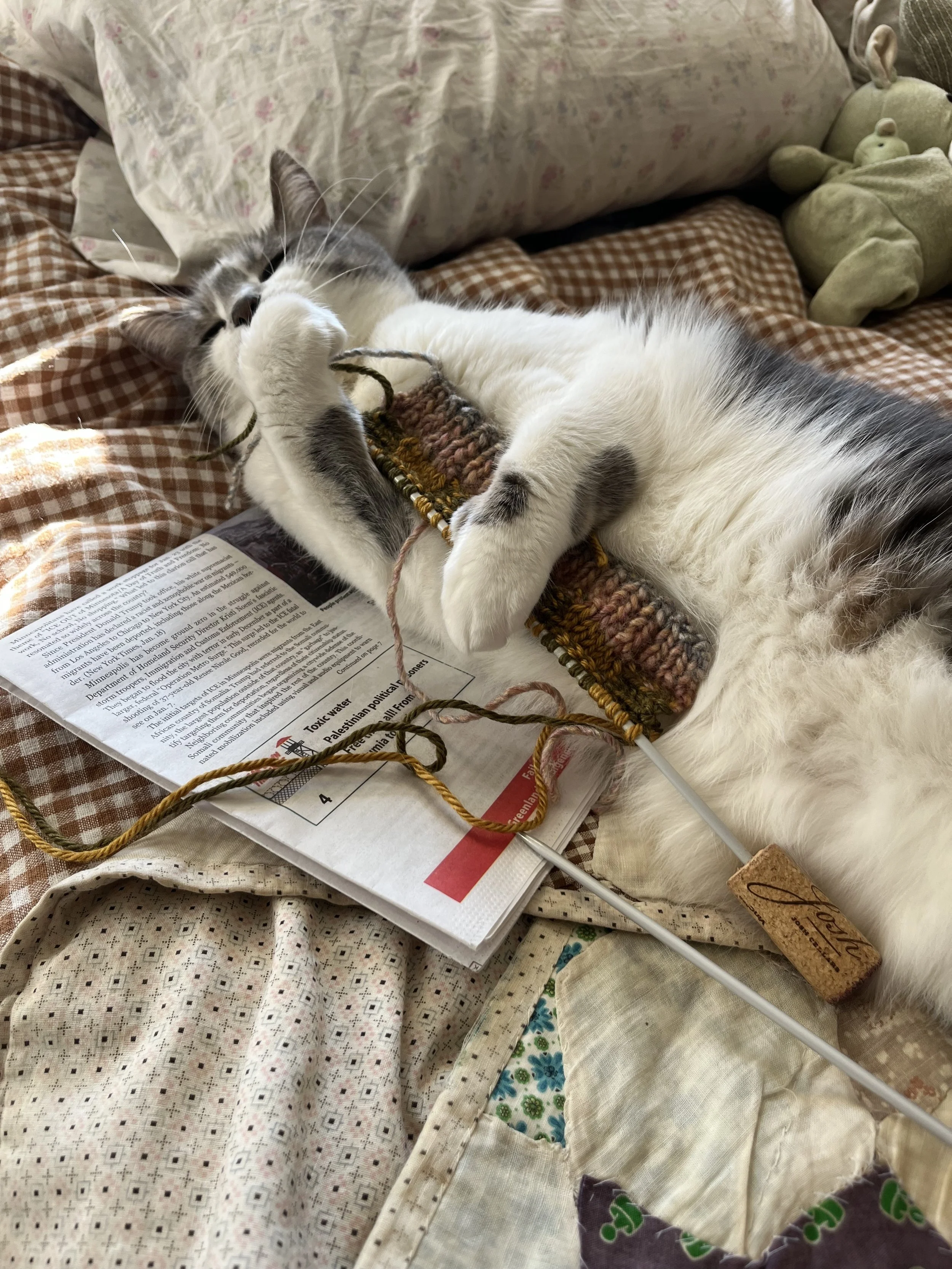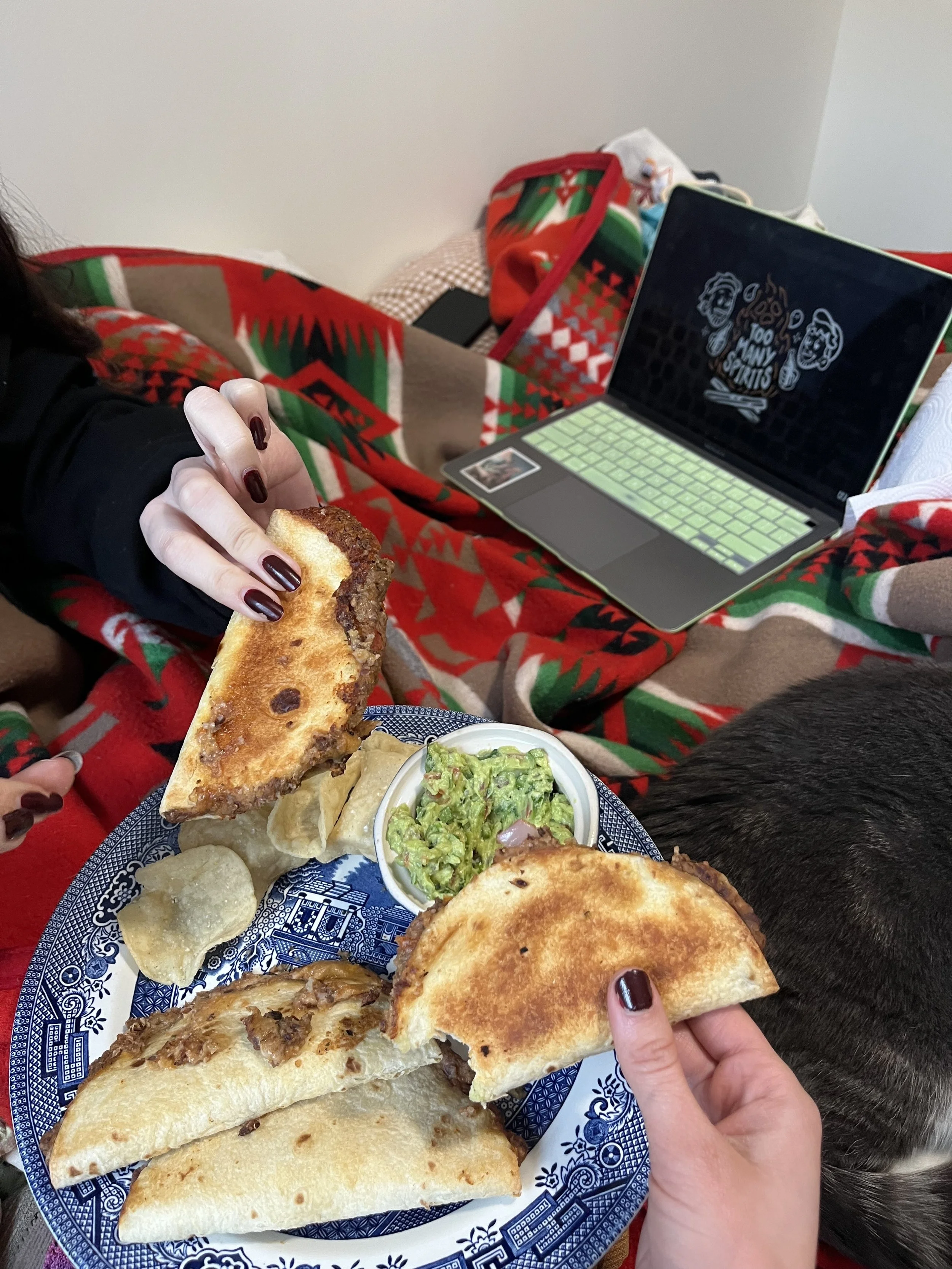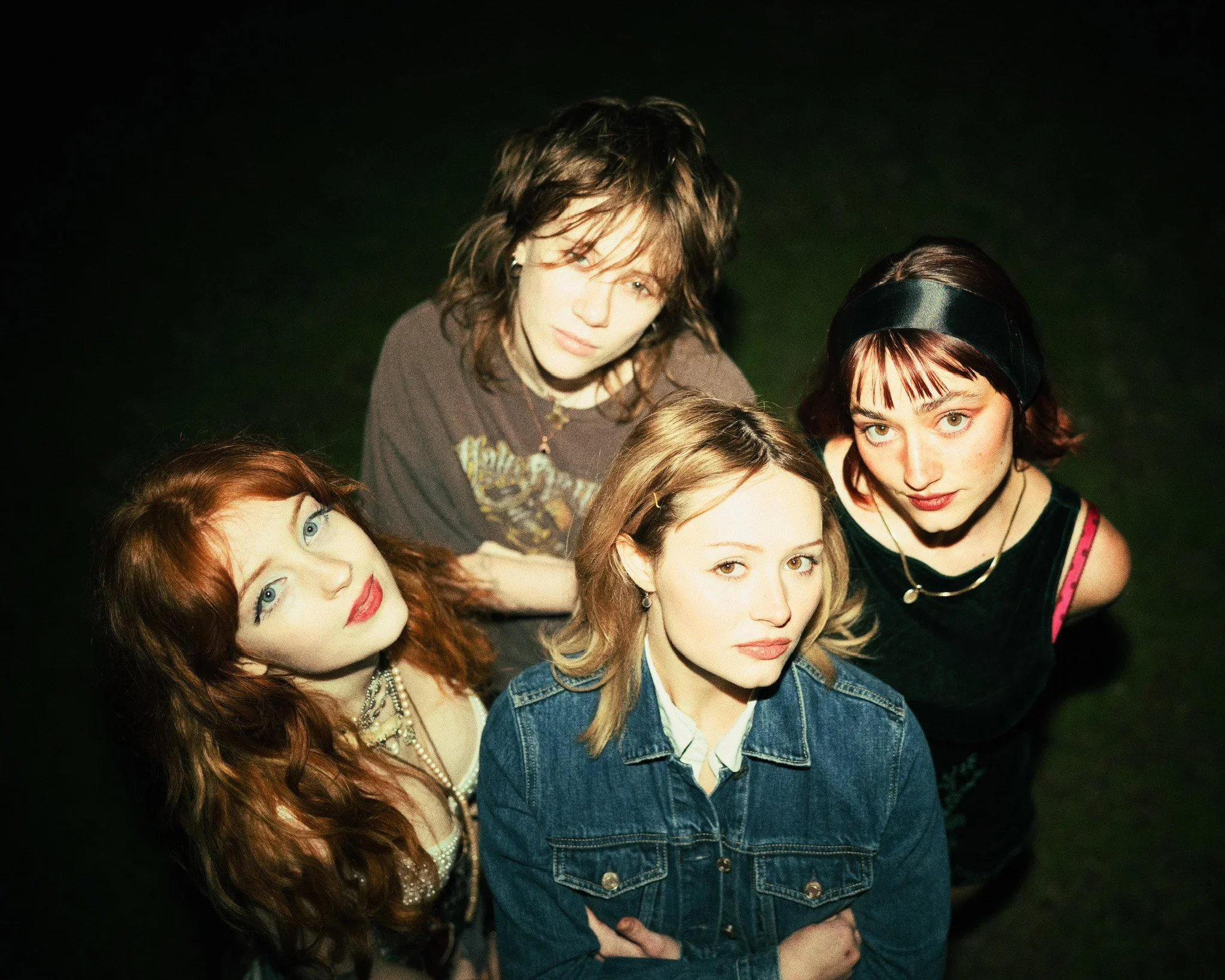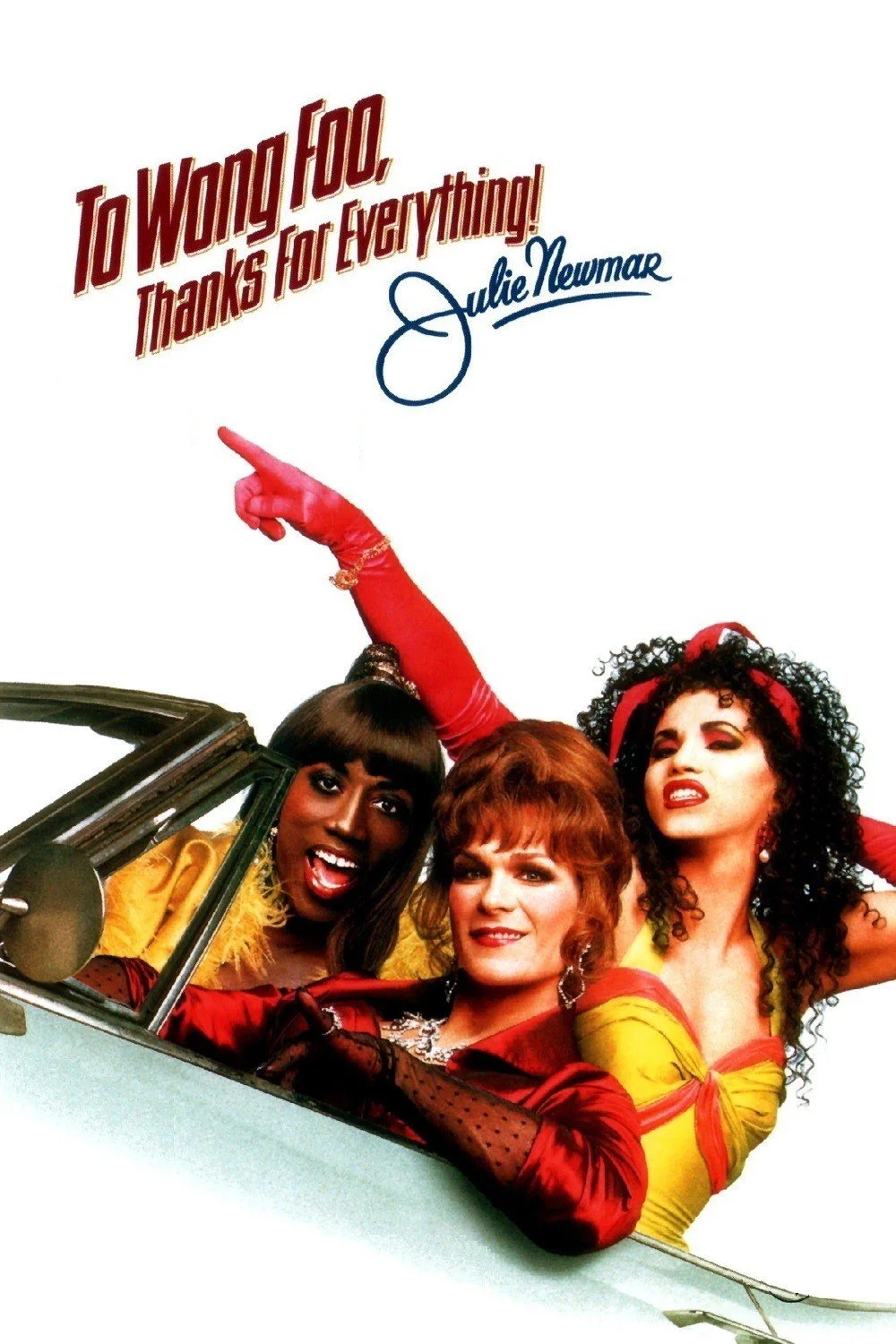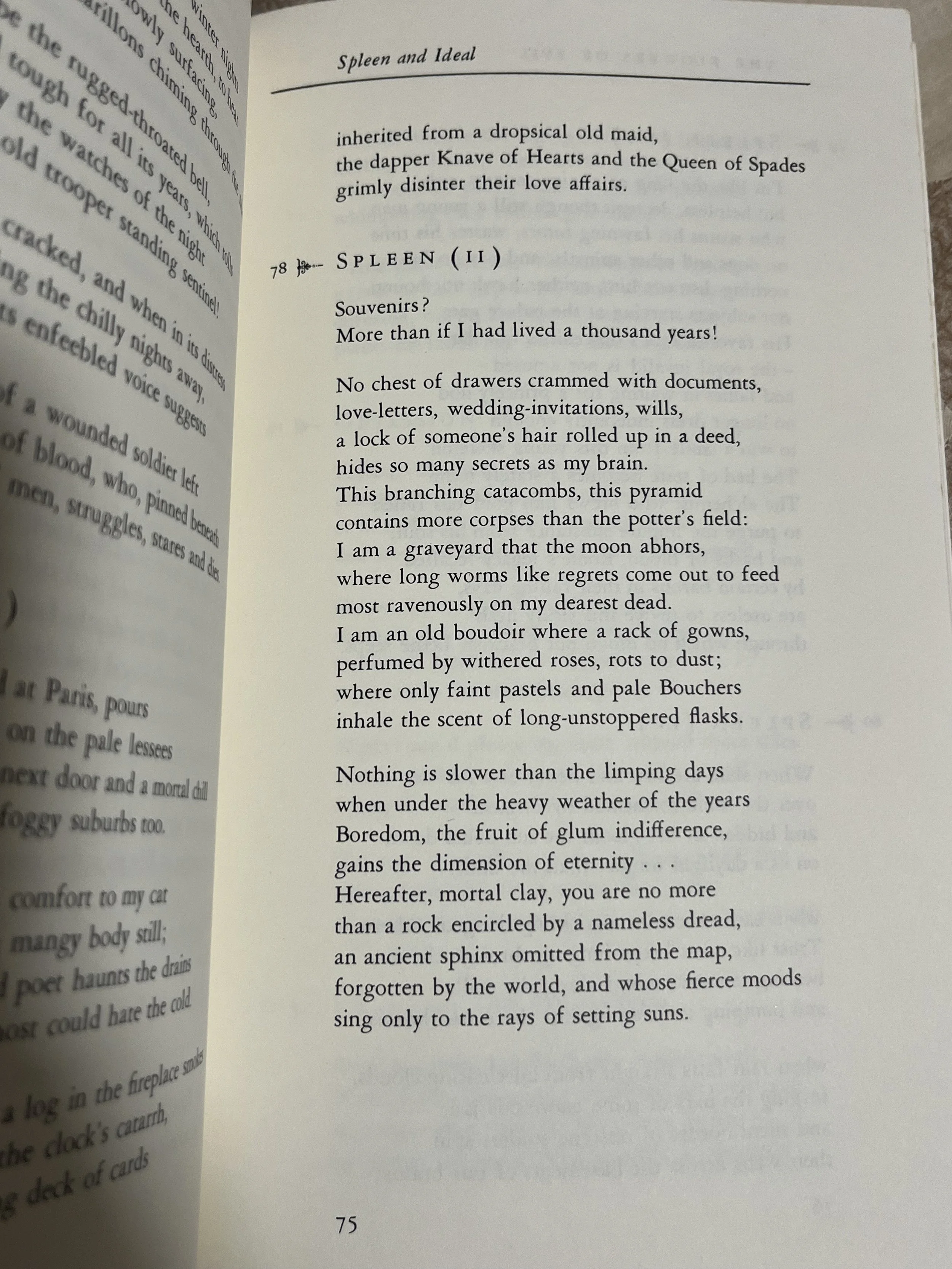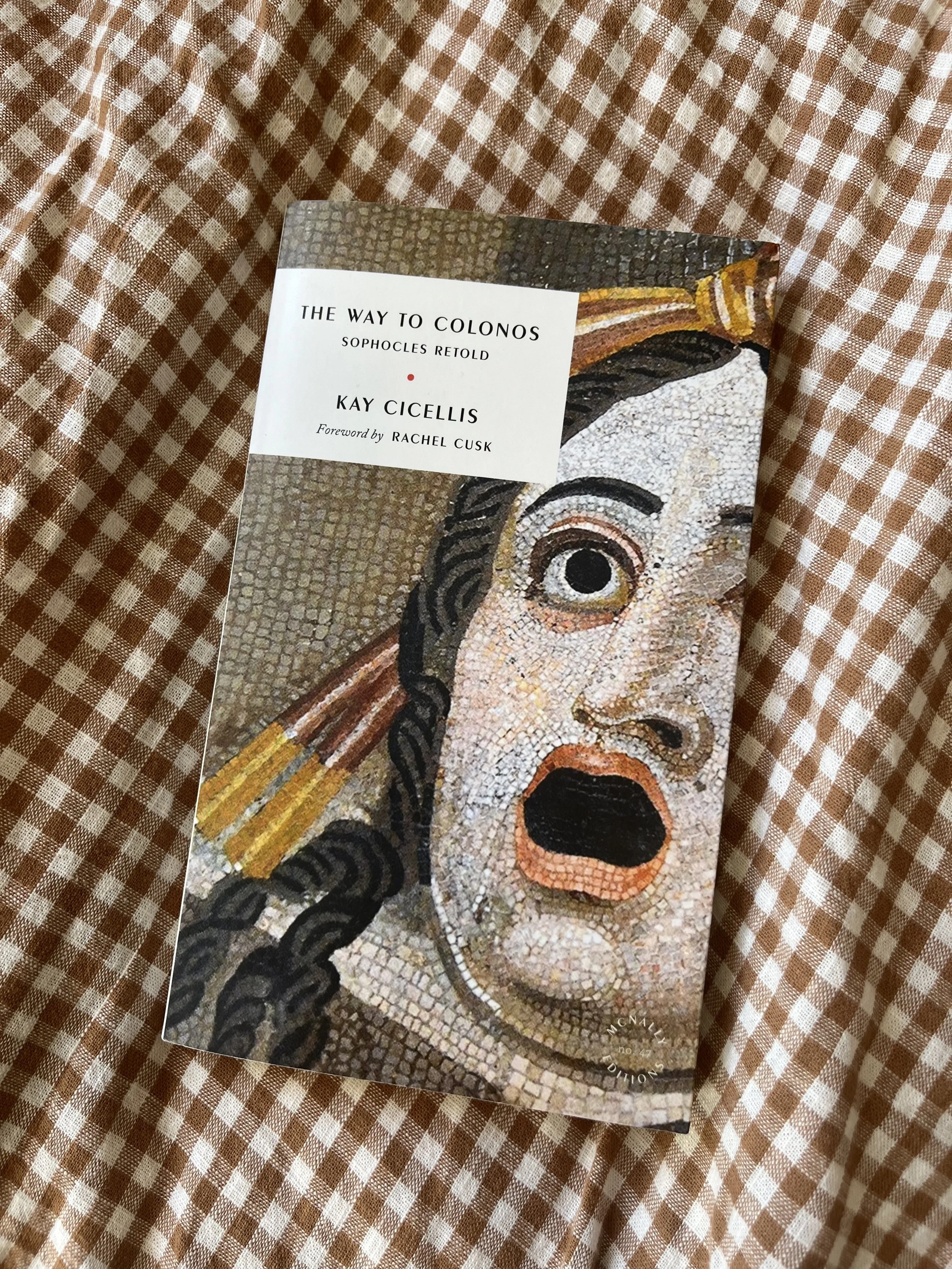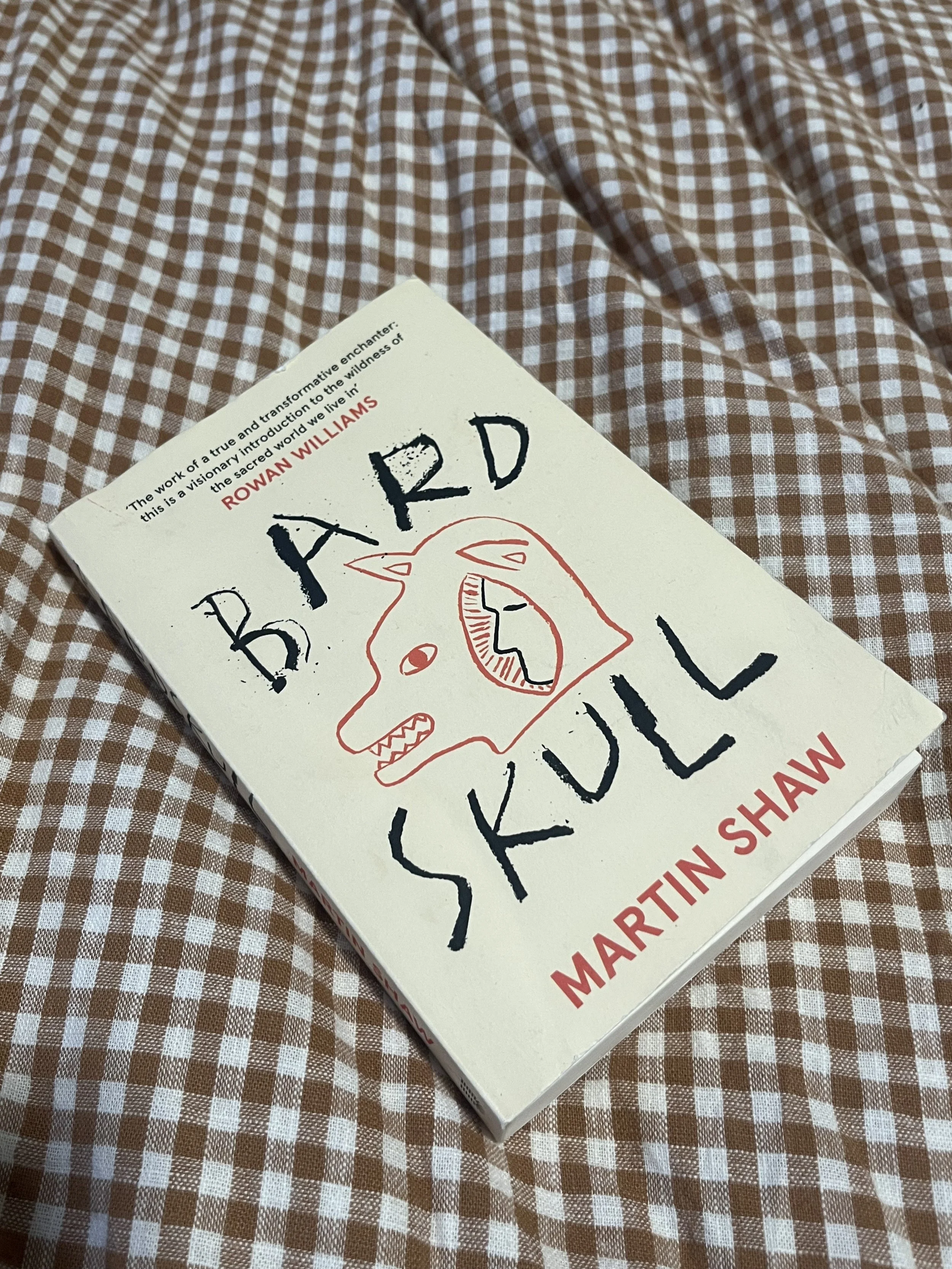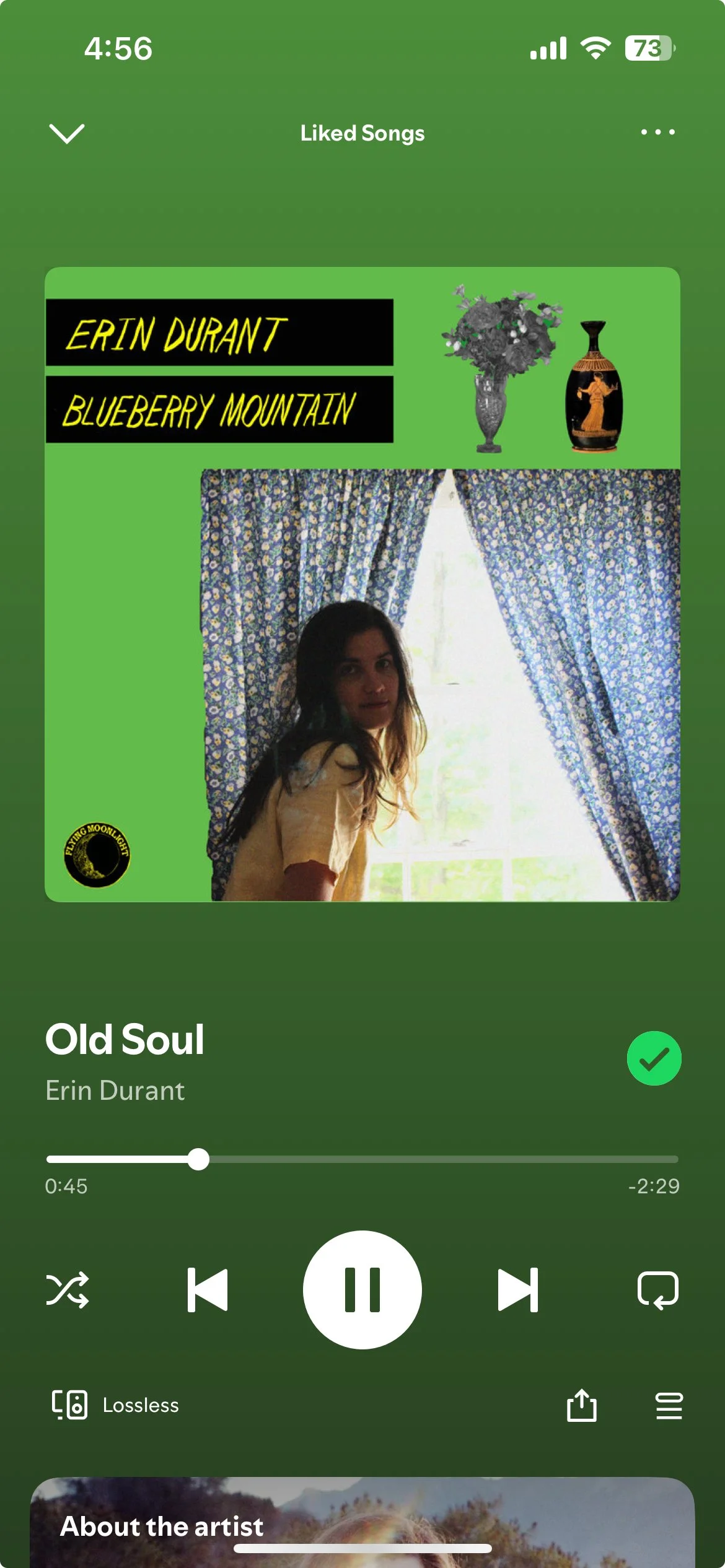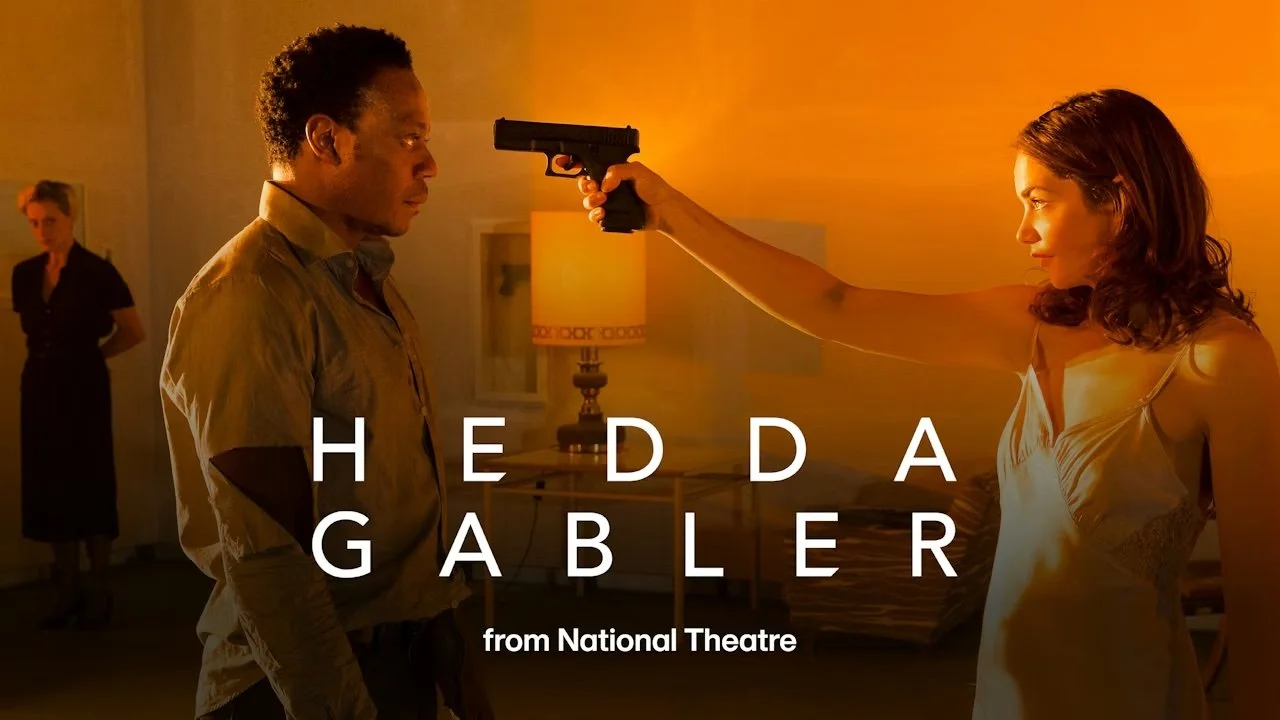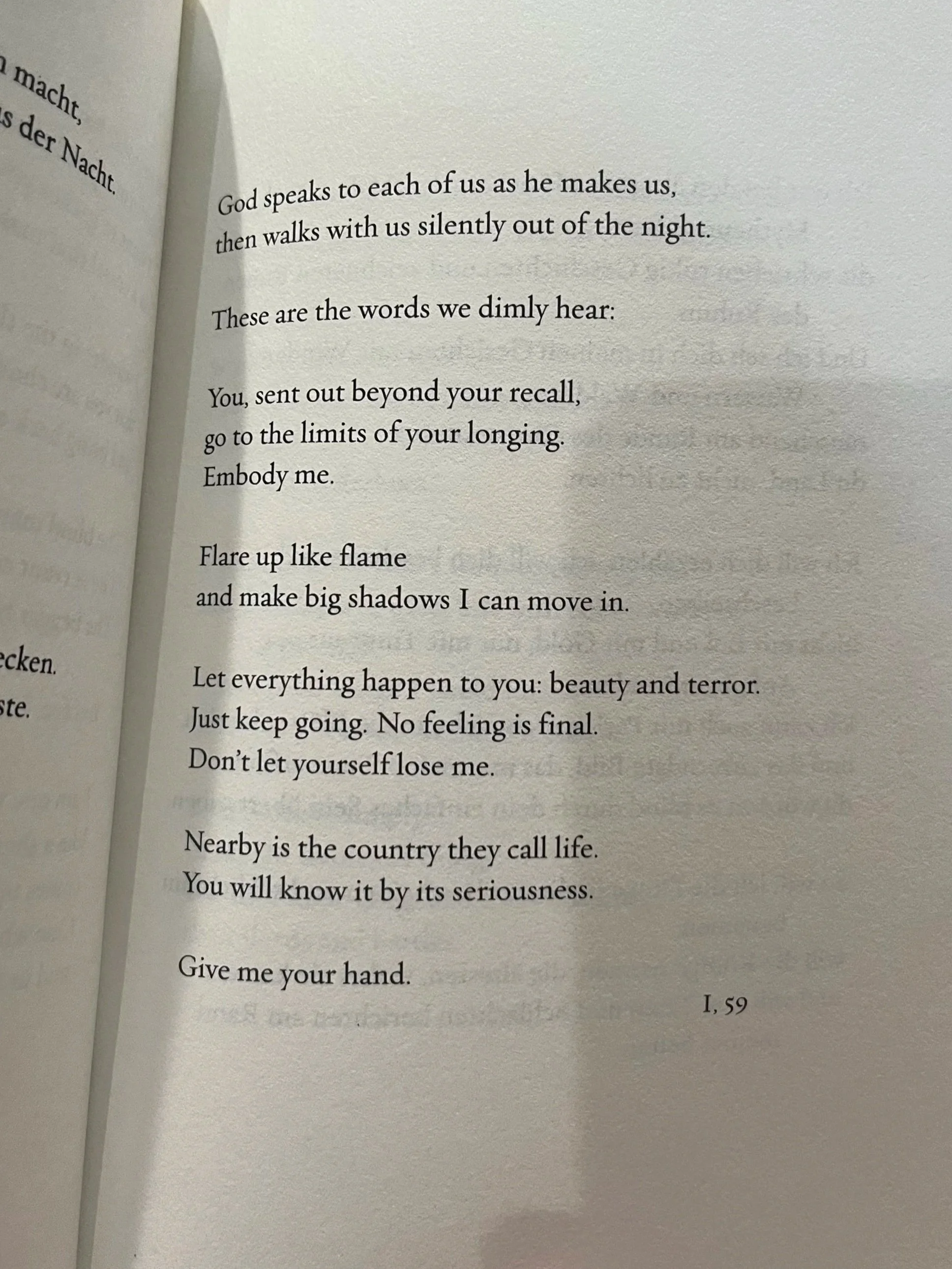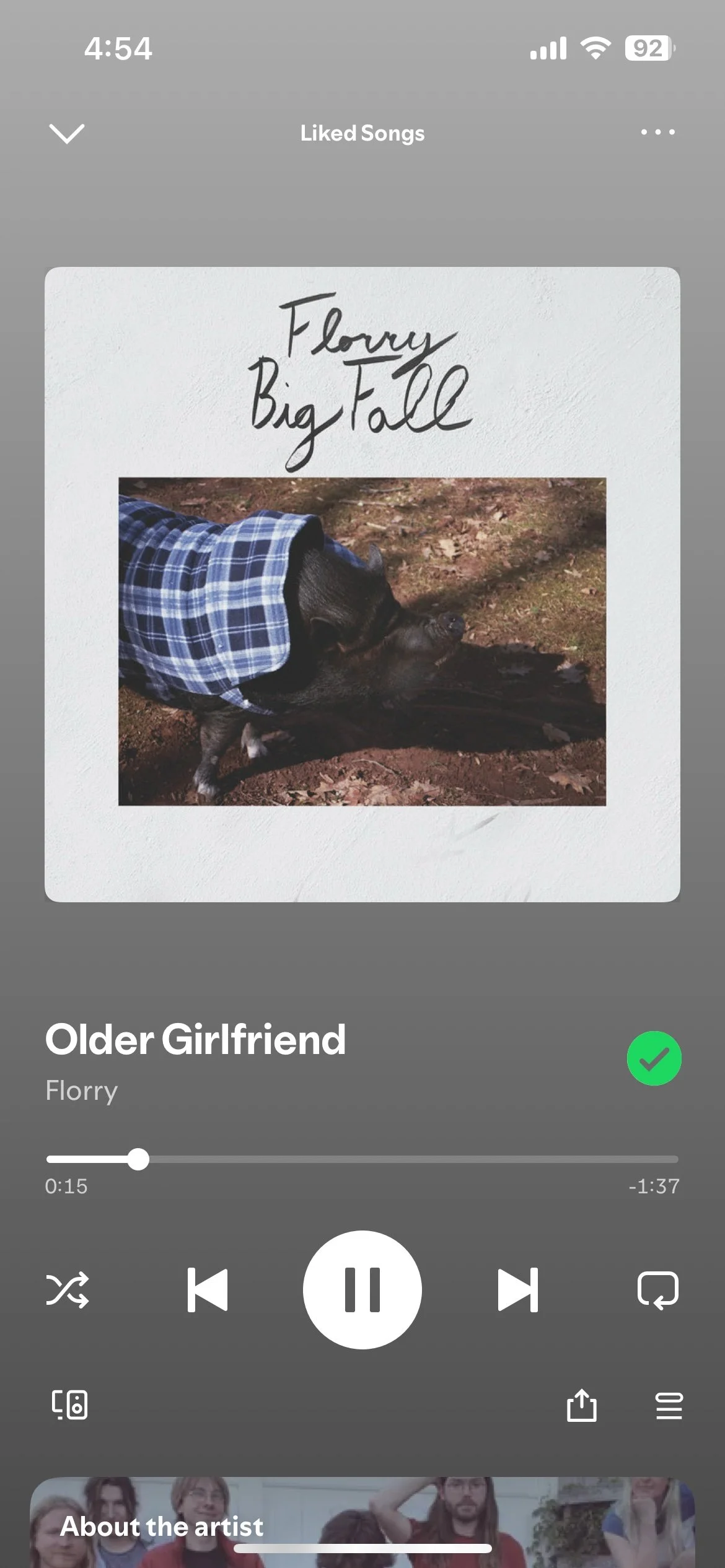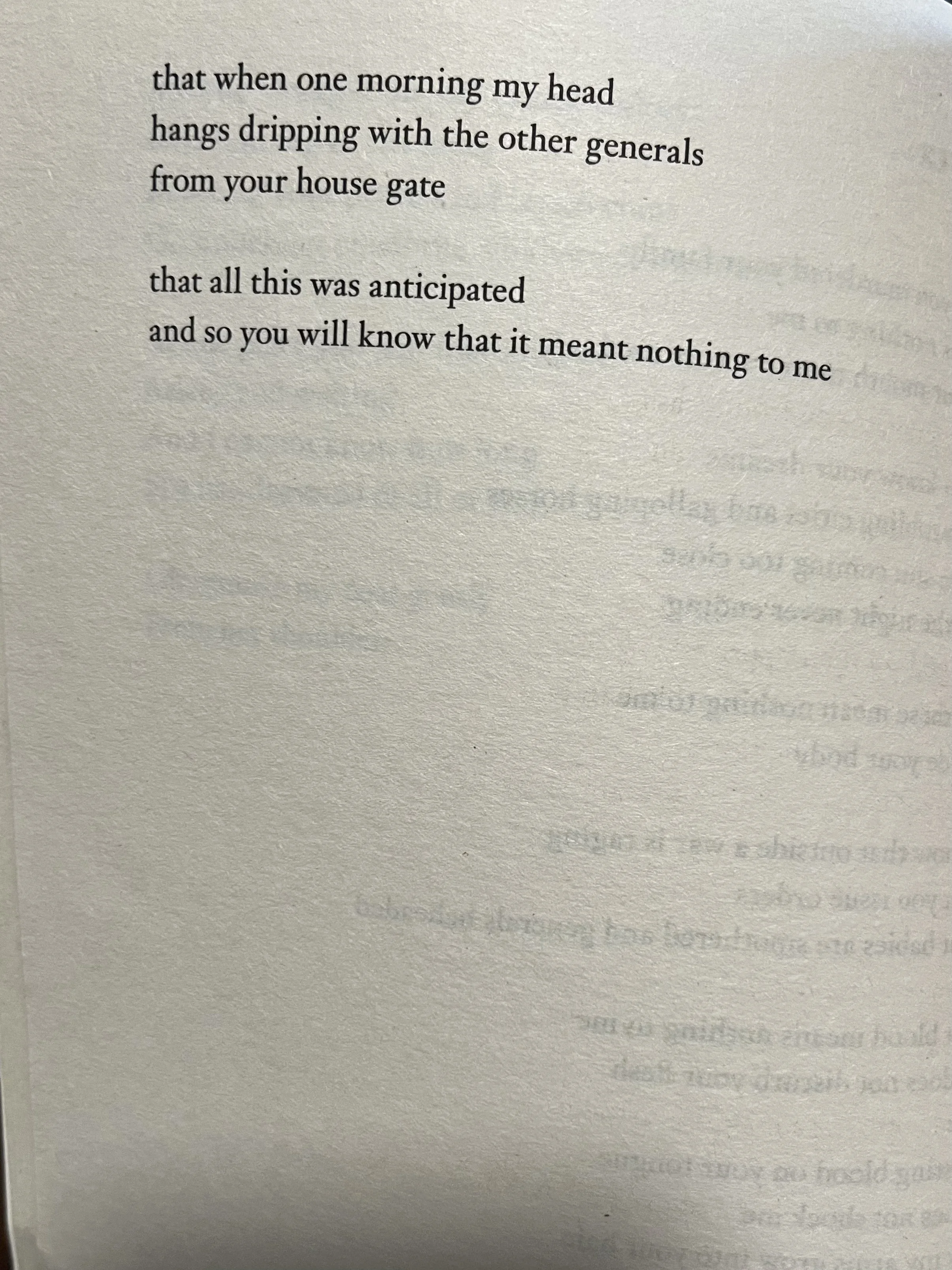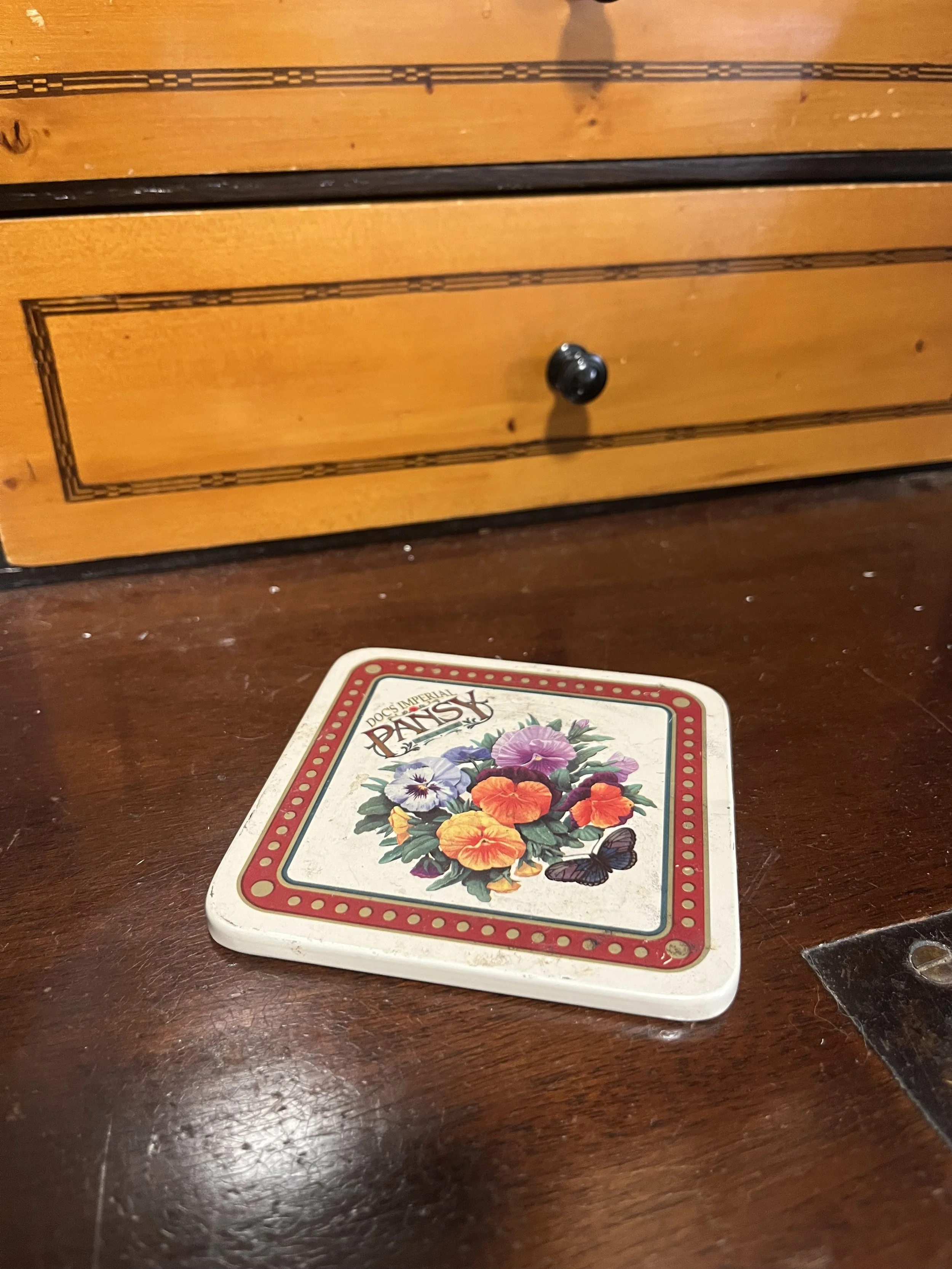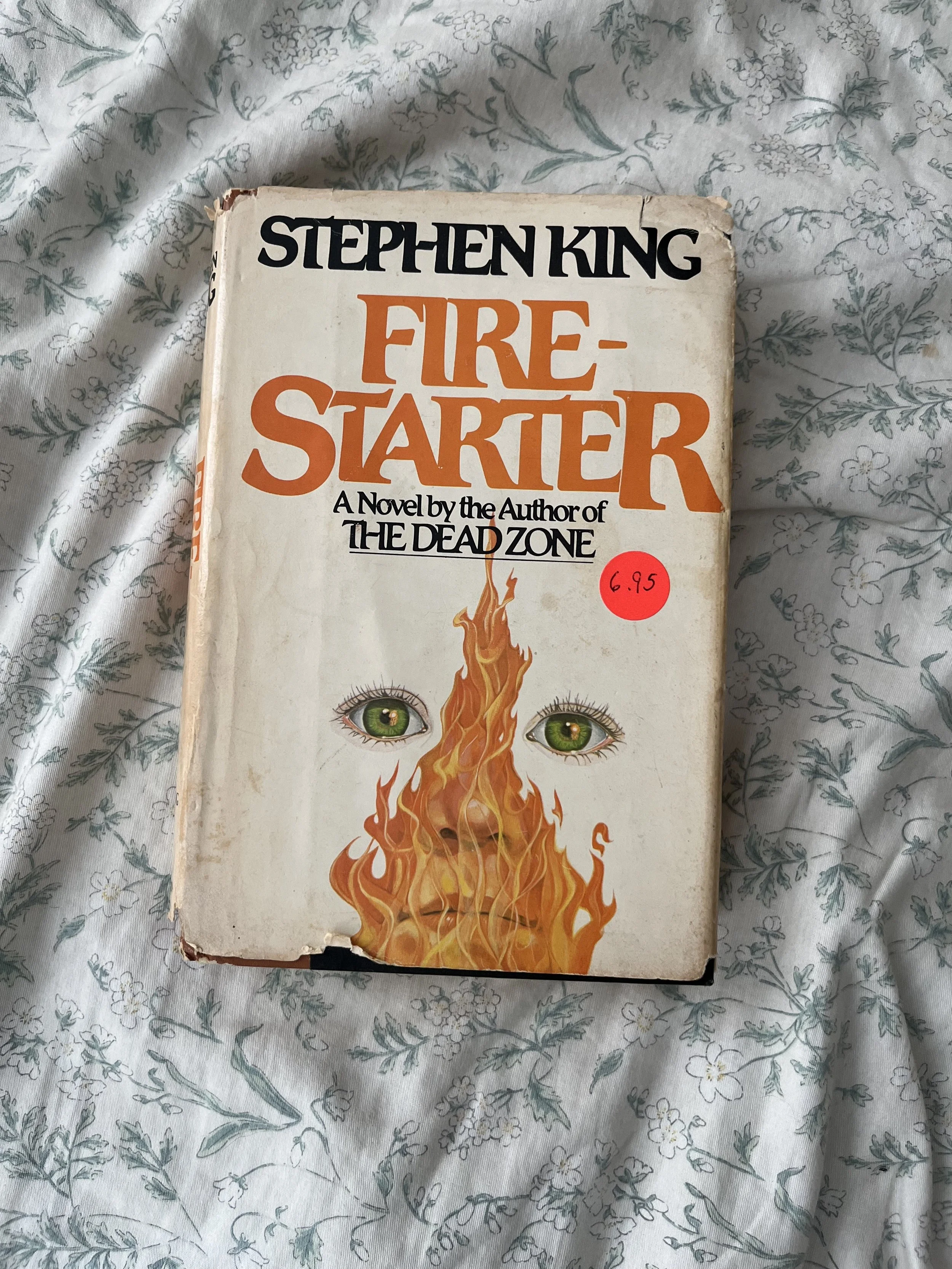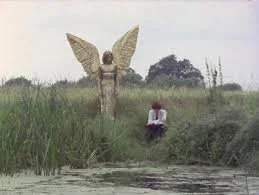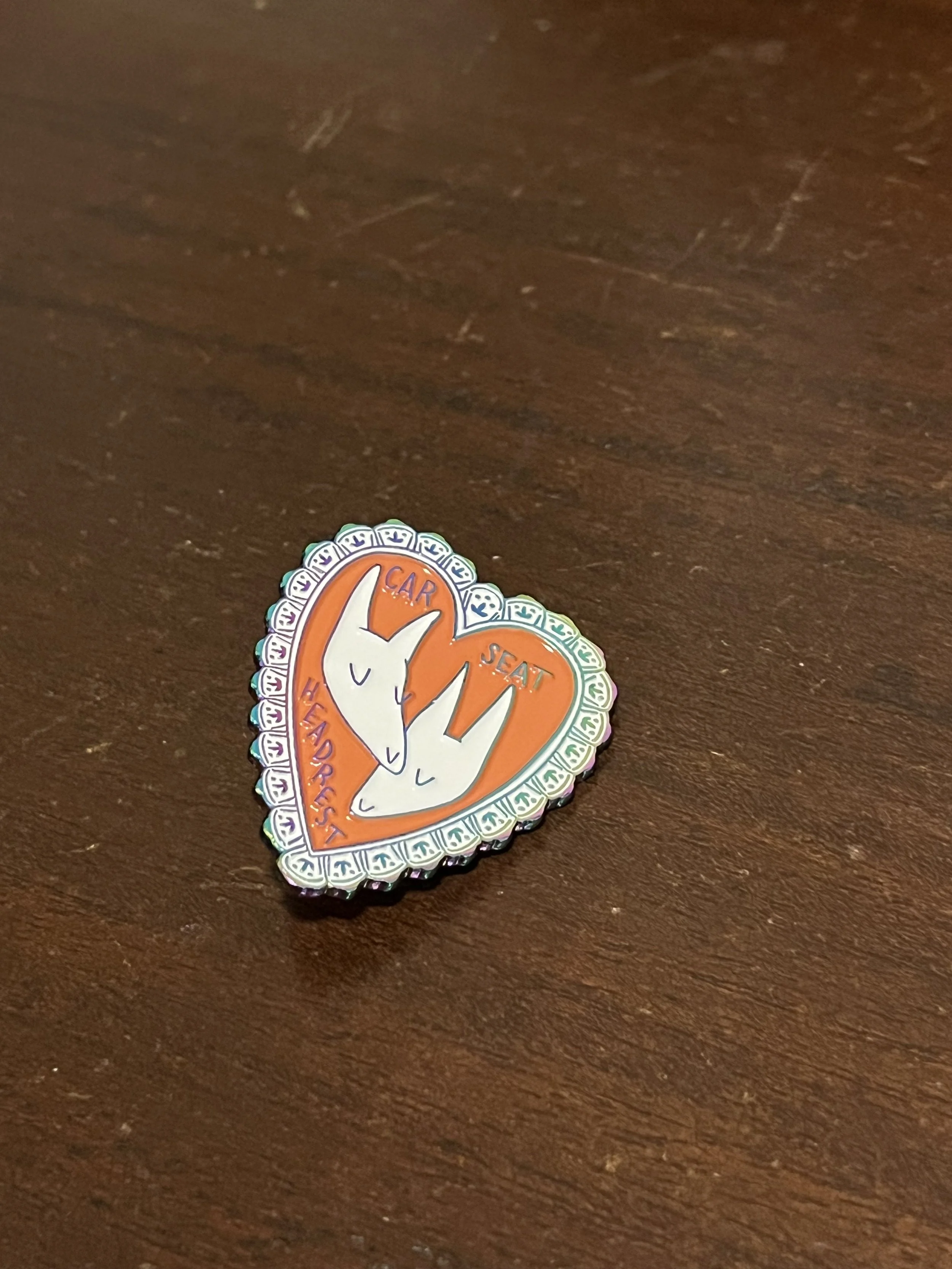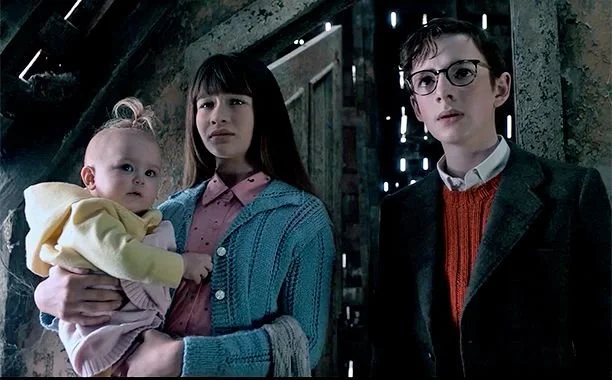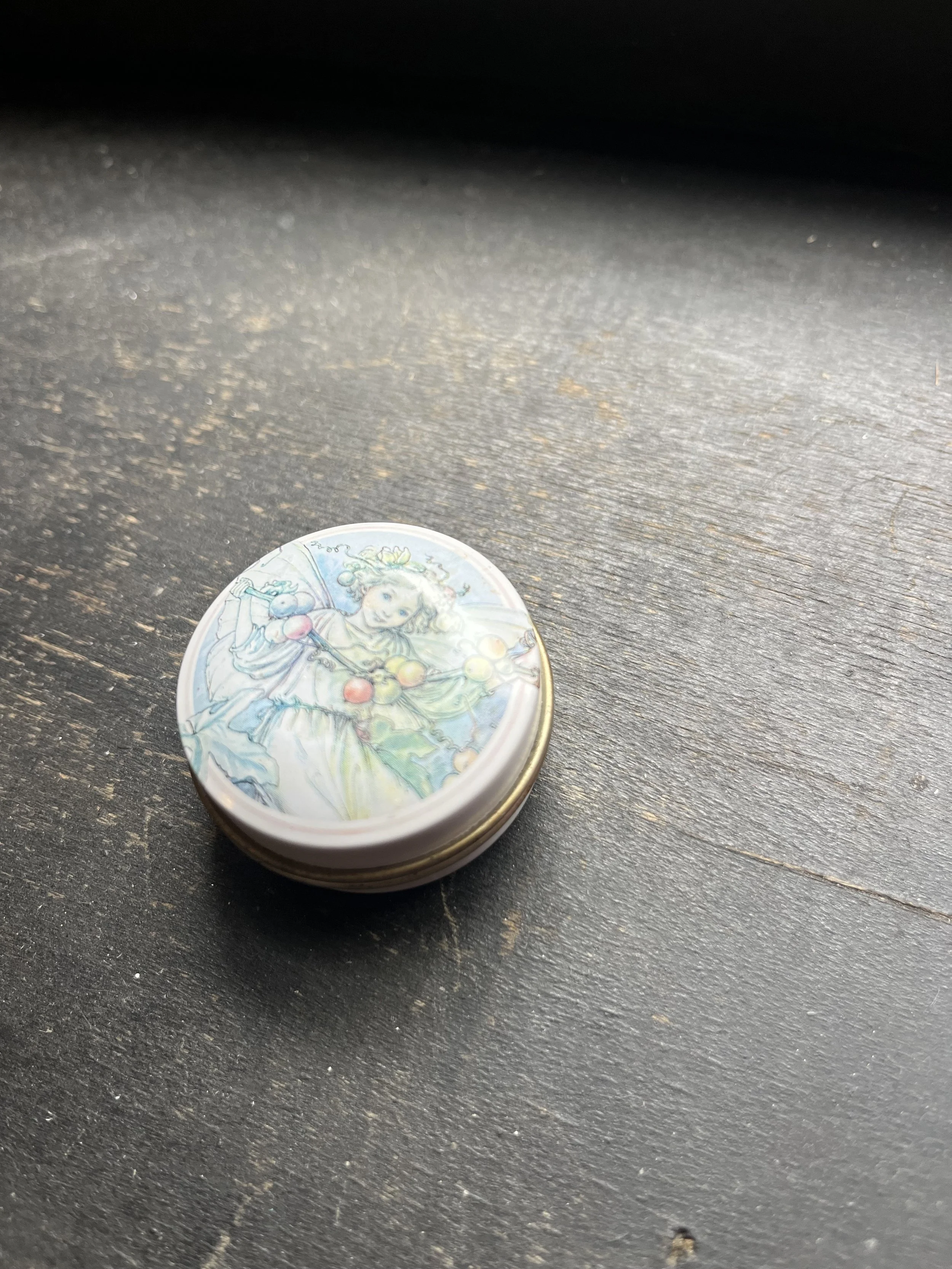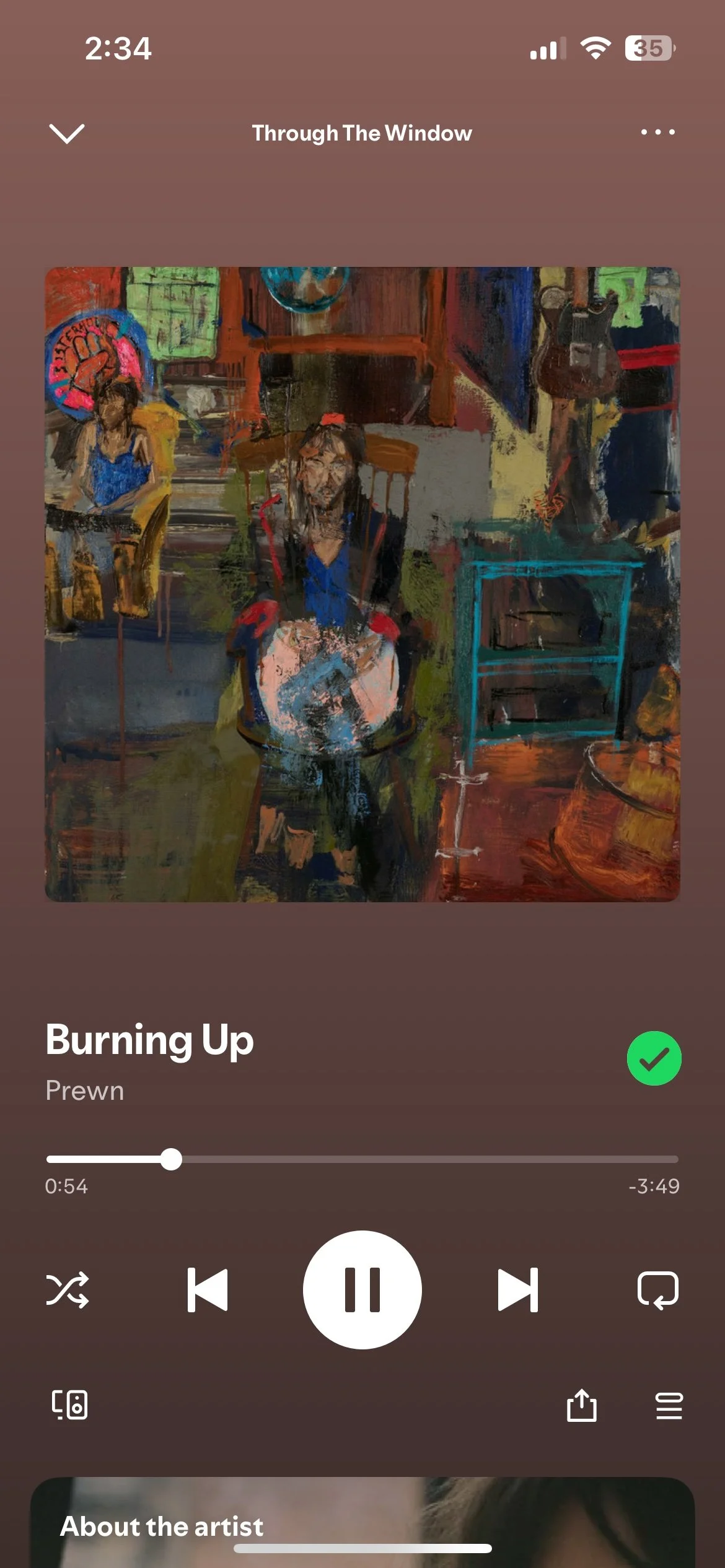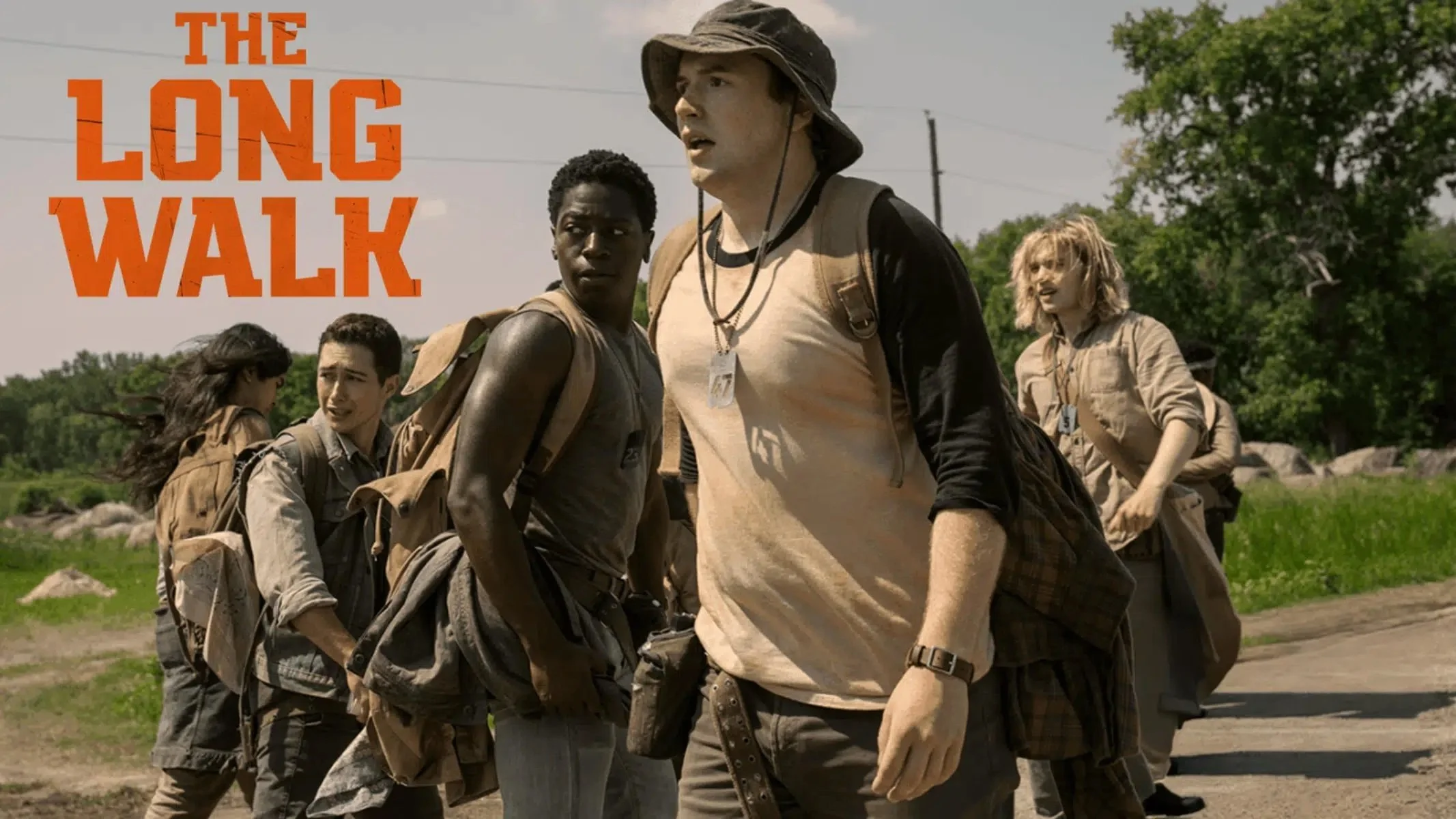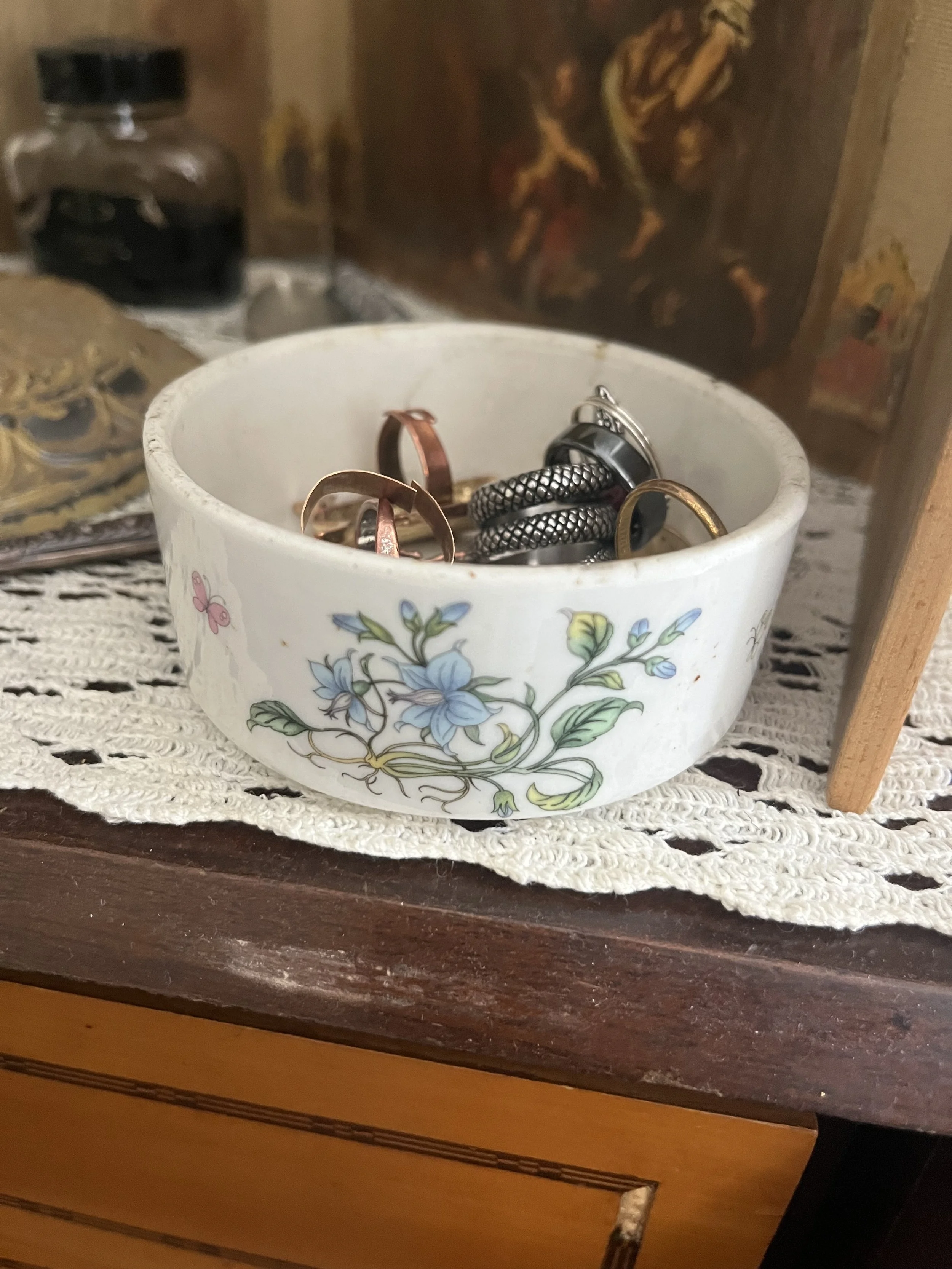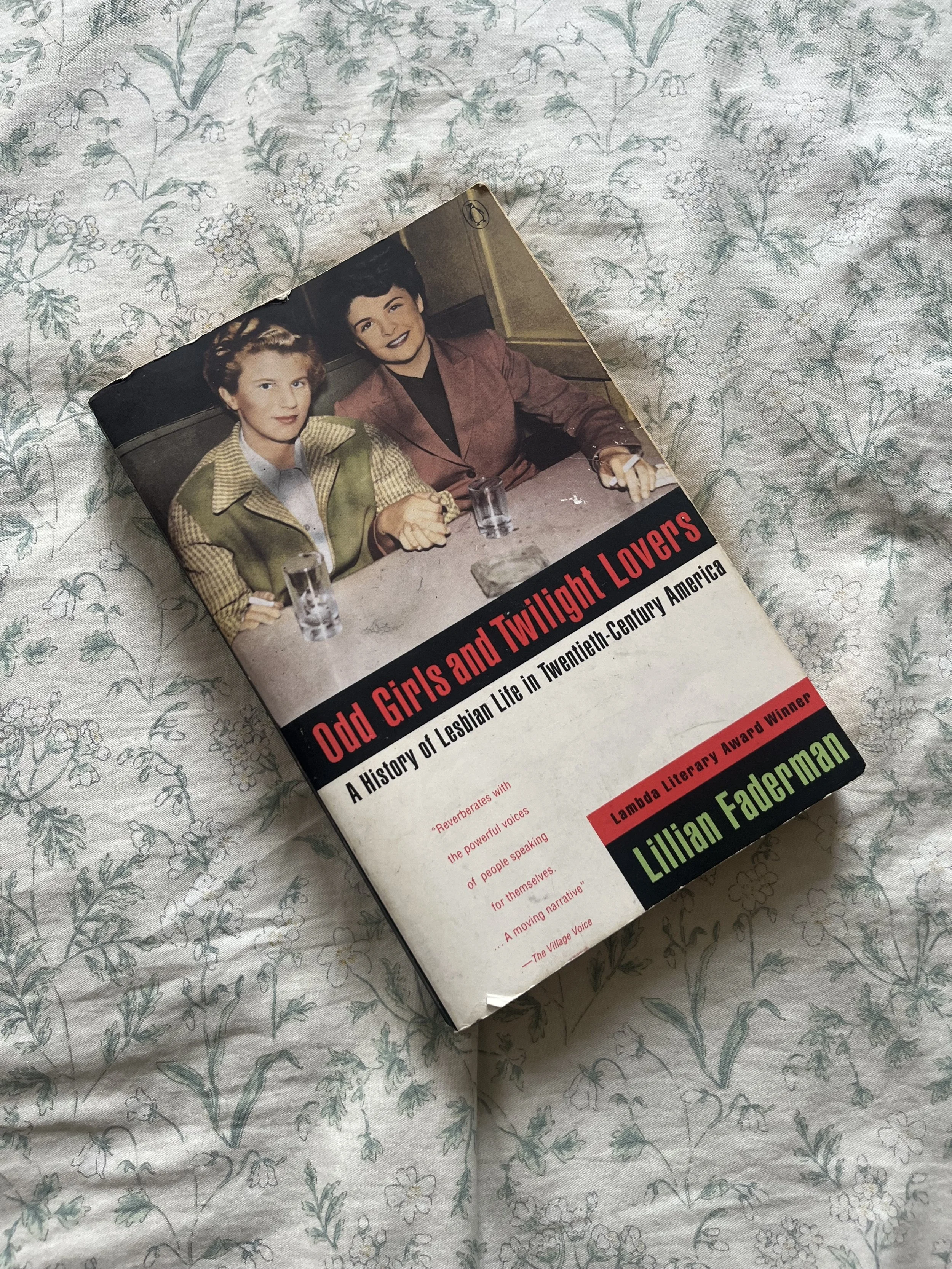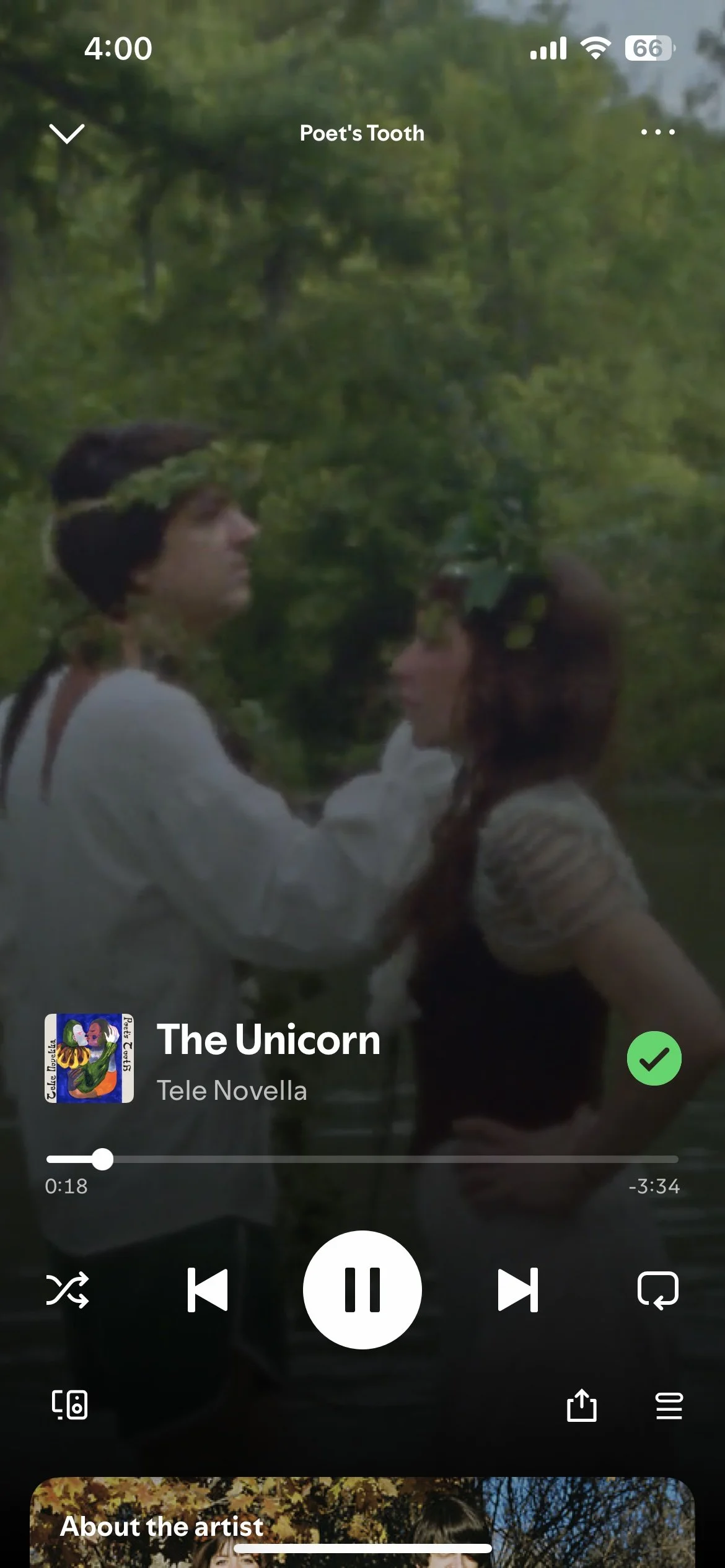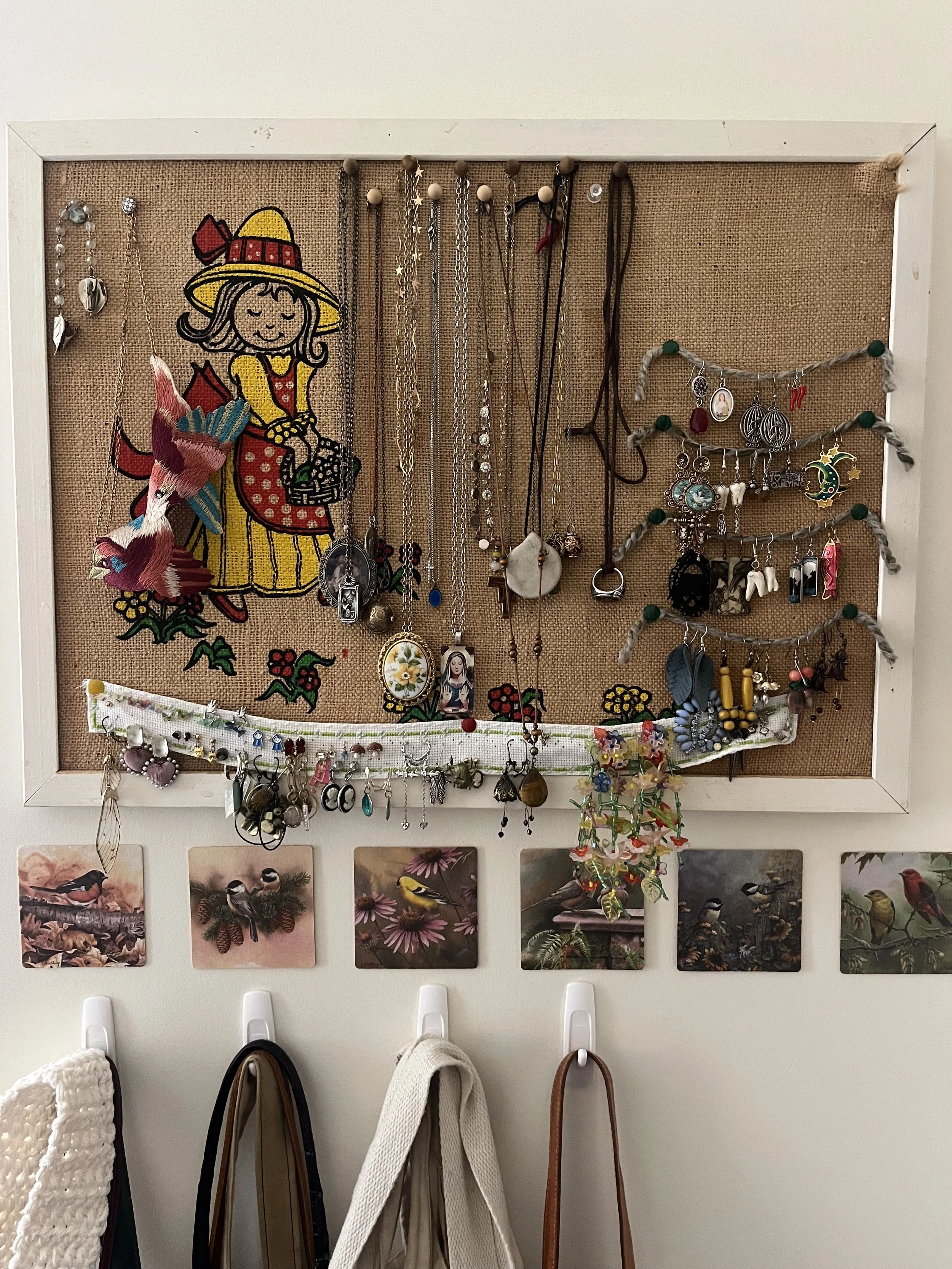Blog
I’m allowed to post whatever I want on here! So says the rules.
Post #16: 5 Cozy Snow Day Activities
1/27/26
II. Listening to an audiobook
Currently I’m listening to Beatrice’s Last Smile: A New History of the Middle Ages by Mark Gregory Pegg. Most of my listening has been happening while I go about my tasks—cleaning, brushing my teeth, making the bed— but I used to love listening to an audiobook while playing sudoku in bed.
III. Painting
I used to paint way more and it’s one of my resolutions this year to make more time for activities I love. I think watercolor is great for a quick, casual craft because it requires so little clean up.
IV. Cooking/meal prep
It’s not just that the oven being on makes the apartment more tolerable, there is really nothing better than an activity which results in something warming and edible. On Saturday I did a massive meal prepping session which included roasted cauliflower and asparagus, crispy black bean tacos for lunch, beyond meat shepherds pie for dinner, and a breakfast bowl of quinoa, asparagus, broccoli, tomatoes, peppers, zucchini, and chickpeas.
V. A shared TV show!
I love sitting on the couch with my roommates! Tattoo it on my chest! We have been watching season 14 and season 18 of Drag Race simultaneously as well as Twin Peaks. I hate the sun setting at 4pm, but it is made significantly easier when the dark = Agent Dale Cooper time.
It’s been cold this week. Nothing like the wet, dreary, seep-into-your-bones sort of cold I got used to in Dublin, but a searing, biting cold you can only experience when it reaches the single digits. Wind howls down the streets and even the shortest trip outside leaves your cheeks ruddy and raw as if you’d been slapped. I’ve convinced myself that only the upper body truly experiences cold, so a 17 minute walk after the sun had set wearing only a thin skirt and wool socks up to the knee was what really got the message through— it’s fucking cold in New York right now.
As much as I would love to be a “there’s no bad weather, only bad gear” sort of person, I am not. When it is physically painful to go outside, I do not want to go outside. Sue me. So here are some of my favorite cozy indoor activities I have been doing while stuck inside for the storm.
Knitting
This is a great pastime for someone (me) who feels the constant urge to be productive. I appreciate an activity that still makes me feel like I’m getting something done. I lost one of my fingerless gloves I made last year, so I’m knitting another pair. An item off the to-do list while still being able to talk to friends or watch something!
Post #15: 1/12 to 1/18 Overview
1/19/26
Literature - Dracula by Bram Stoker. Last year I would pass by the house where Stoker wrote this on my way to the recycling center. My cousins gifted me this pretty copy a few Christmases ago. I’m only about a hundred pages in. It’s good, but God, subtlety is not his strong suit.
Music - Die Spitz. My roommate has been a huge fan for a while and I always liked them when she’d put them on, but all of a sudden this week I can’t play anything else. They’re so good and also the hottest people I’ve ever seen in my entire life. The “Hair of Dog” music video? Ohhh my god. Fetch my smelling salts fr. Favorite tracks: “Hair of Dog” and “I Hate When Girls Die”.
Film - A group of assorted lesbians and queer women that we’ve collected since moving here all came over for movie night this week. We watched To Wong Foo, Thanks for Everything! Julie Newmar (1995). God, it was so good! Obviously a little dated, but still, I think ahead of its time. I laughed! I cried! What else could you want!
Poem - Reading Baudelaire in bed again. Surely a good omen.
Food - No photo was taken but I made a gorgeous ramen on Friday. Celery, broccoli, onion, garlic, bok choy, marinated soft boiled egg, and green onions, crispy tofu crumbles, and peanuts for garnish. You’ll just have to take my word for it.
Post #14: Thoughts on The Way to Colonos
1/12/26
Kay Cicellis’s The Way to Colonos is a slim volume: three stories adding up to less than two hundred pages. Each one takes the structure of a tale from Sophocles: Antigone and Oedipus, Electra and Clytemnestra, and Philoctetes. Though it’s advertised as a modern retelling, this feels like a somewhat limiting descriptor. These are not simply characters from Greek tragedies placed in a different time and place— these are people entirely their own, trapped in the repeating spiral of history and myth. They have rich and textured lives, and, like their theatrical predecessors, they have been fated since the beginning to live out their archetypal roles. At times they tug against their narrative chains, though seemingly aware of the futility, the soldier of the final story even remarking, “I am no Philoctetes, I have no god Hercules to tell me why I must serve, or to promise glory after the suffering. I only know I’ll take the role” (165).
The first story, entitled “The Way to Colonos”, is a mirror of Antigone’s accompaniment of her father into exile. Only this Antigone is not simply doing so out of duty and righteousness— she too feels she deserves banishment. Unlike the Antigone of myth who stood so steadfast in her morals, Cicellis’s Antigone is far too human in her mistakes. She has transgressed again and again and, in her youth, only realized after she had gone too far. There is a crushing, suffocating guilt, helplessness, and desire for punishment, that I found so compelling and strikingly relatable. It is only when her father, whom she alternatively pities and loathes, admits that he too has transgressed too far, that she feels the pulls of duty and devotion. Companions in their shame, they set out to remove themselves from the world.
The second story, “The Return”, is perhaps the most obvious in showing the trapped nature of the characters. Electra, renamed Eugenia, lives with her mother in a bitter feud, awaiting the return of her brother to deliver punishment. Cicellis is adept at making every character so unlikeable, yet so interesting. Eugenia finds her own hatred delicious, cannot tear herself away from it, and is in love with her own martyrdom and suffering. Clytemnestra is a larger than life, mysteriously magnetic powerhouse of a woman who is simultaneously pitiable in her pathetic selfishness. Aegisthus, called “The Reverend”, exists only in the wings, calling out from an unseen room from time to time, but both he and Orestes loom over the story in their absence. The whole story is excellent— Cicellis is ruthless and honest in her portrayals.
The third and final story, “The Exile”, seemed as though it would be my least favorite of the three. The characters felt less electric than the first two, but the final scene, in my opinion, made up for this. Philoctetes, here called Rigas, lives in political exile in the mountains of a remote island. He is needed again by the very person who betrayed him, and a young soldier is sent to persuade him to return. For most of the story, we hear little of his own voice, mostly hearing from the young man who has imagined an entire life for Rigas in the wilderness. Finally, when Rigas corrects him and explains what life has really been like for him, Cicellis’s magic shines in full force— jumping between topics like solitude, man and nature, fate, God, and fear, her voice booms through the pages. It is a howl.
Post #13: 2025 in Books
1/12/26
I don’t leave reviews on books, but here are my very abridged thoughts on every book that I read this year.
Hildegard of Bingen: A Visionary Life by Sabina Flanagan
This was the first book I finished in 2025. I remember it being interesting, but that I wished it had spent more time on her religious writings and less time on her scientific and medicinal work.
His Black Tongue by Mitchell Lüthi
Oh my god, I hated it. It sounded right up my alley, but I found the writing juvenile and the stories egregiously rushed.
Parable of the Sower by Octavia Butler
A classic for a reason. So beautifully written. Urgent.
On the Road by Jack Kerouac
I’m pretty torn on this one. I think I have a special place in my heart for the beats. I’ll always sort of wish that I had been born a man in the forties or fifties so I could train hop and sleep outdoors and go on all sorts of adventures, so it appealed to that side of me. I also think I’m generally pretty forgiving of sexism in writing of this period or earlier, but for some reason in this book, I found Kerouac’s treatment of female characters distractingly bad.
If Beale Street Could Talk by James Baldwin
So beautiful. Such compelling characters, beautiful story, and in Baldwin’s incomparable prose.
The Need for Roots by Simone Weil
I really liked this! Every now and then she had a take that I thought sort of came out of left field, but for the most part I thought she was spot on. It made me reevaluate my own morals and they way I move through the world.
Great Italian Short Stories of the Twentieth Century
They sure were some great Italian short stories of the twentieth century.
Let Me Tell You: New Stories, Essays, and Other Writings by Shirley Jackson
I loved this! I just needed a new book and happened to see this at the library. I love Shirley Jackson, but I had never read any of her nonfiction. I thought all her essays were so charming, especially the one about getting used to her haunted house in Vermont.
For Thy Great Pain Have Mercy on My Little Pain by Victoria MacKenzie
This is now the second historical fiction book I’ve read that imagined Margery Kempe as being the person who disseminated Julian of Norwich’s manuscript. This one was much better than the first.
Into the Wild by Jon Krakauer
I could cry just talking about it.
Regarding the Pain of Others by Susan Sontag
Good, but I didn’t enjoy this as much as I had expected to. I don’t remember why.
The Haunting of Hill House by Shirley Jackson
A reread. Never fails to thrill. She’s a genius.
Paradise Lost by John Milton
I read this in three days while on the beach in Tenerife. Certainly a way to experience it.
Mr. Splitfoot by Samantha Hunt
Fun! First book I’ve read that took place in Troy, NY.
Homesick for Another World by Ottessa Moshfegh
Agh, I love her. Every character is such a pathetic piece of shit.
I Who Have Never Known Men by Jacqueline Harpman
A quick, but depressing read.
The Turn of the Screw by Henry James
Also fun!
Monstrilio by Gerardo Sámano Córdova
So wonderful. I’m still thinking about it.
The White Goddess by Robert Graves
This book was such a slog, but I’m glad I got through it. I will say, the part about 500 pages in where he admitted that he had just been making everything up based on his poetic intuition instead of the scholarly research he had originally presented it as drove me into a blind rage, but I feel wiser for having read it. It rewired the way I understand stories. And I have recognized his influence in so many works since reading this.
Starve Acre by Andrew Michael Hurley
Beautifully written and thrilling all the way through. I found the ending slightly disappointing, though.
Precious Bane by Mary Webb
Not the most exciting book, but so beautifully written. I would get lines from this tattooed across my chest. Here’s a great one: “We are so small and helpless on the earth that is like a green rush cradle where mankind lies, looking up at the stars, but not knowing what they be.”
The Faggots and Their Friends Between Revolutions by Larry Mitchell
Fun!
Grey Dog by Elliot Gish
I definitely enjoyed this, but not as much as I had hoped.
The Book Collector by Alice Thompson
HATED IT! Oh my god.
The Hearing Trumpet by Leonora Carrington
This was my first Leonora Carrington book— I’d only known her from her paintings. This is exactly the sort of book I would have expected from her. So strange in the best sort of way.
Sexing the Cherry by Jeanette Winterson
I love Jeanette Winterson. This is the sort of book that reminds me why I write.
Bloodroot by Amy Greene
Absolutely gorgeous. Such strong voices throughout and a beautiful story. I cried multiple times.
Hangsaman by Shirley Jackson
I loved the beginning, was kind of meh about the middle, and loved the ending.
Fen by Daisy Johnson
Not a huge fan.
Don Quixote by Miguel de Cervantes
There’s not really much more to be said. One of the most famous works of all time for a reason.
Milkman by Anna Burns
Oh this was great! Anna Burns has such a unique style and I ate it up!
The Unworthy by Agustina Bazterrica
Good! Interesting.
The Posthumous Memoirs of Brás Cubas by Machado de Assis
This was given to me by a coworker as an introduction to Brazilian literature. I loved it! So strange.
Odd Girls and Twilight Lovers: A History of Lesbian Life in Twentieth Century America by Lillian Faderman
Loved! I wrote more about my thoughts on this book earlier in this blog.
The Stone Door by Leonora Carrington
I enjoyed it, though not as much as The Hearing Trumpet.
The Fran Lebowitz Reader by Fran Lebowitz
A good time.
Firestarter by Stephen King
Also a good time!
Jung and Christianity: The Challenge of Reconciliation by Wallace B. Clift
An interesting time.
Bastard Out of Carolina by Dorothy Allison
Cried in the break room upon finishing this. So heartbreaking.
The Hawkline Monster by Richard Brautigan
Richard Brautigan is one of my favorite writers, but I was turned off from this one when I tried to read it a few years ago. I still wasn’t a huge fan when I started it and was sort of shocked by how many people loved it, but by the time I finished, I did understand.
East of Eden by John Steinbeck
Easily one of my favorite books ever written now. Holy shit. I can’t remember the last time I reread entire chapters immediately upon finishing them just to experience it again.
Dark Tales by Shirley Jackson
Another reread. Love her.
Rilke’s Book of Hours: Love Poems to God by Rainer Maria Rilke
Agh! So beautiful! .
Post #12: 1/5 to 1/11 Overview
1/12/26
Literature — Bardskull by Martin Shaw. I simultaneously really liked this and felt that, no matter the situation, this author has to be the most unbearable person in any given room.
Music— “Old Soul” by Erin Durant
Film— Not really a film, but I did watch the National Theatre at Home’s production of Hedda Gabler.
Poem— “Go to the Limits of Your Longing” by Rilke
Food— A gorgeous breakfast! Clementine, fried egg, everything bagel, and spinach with garlic and feta.
Post #11: On a Prolonged Absence
12/29/25
To all my faithful, devoted readers (hi Mom), it’s obvious that I fell off the weekly posting pretty dramatically. Ah, the consequences of employment! There are things I’ve loved about my job and things I’ve hated, but being out of the house from 7:45am - 7:15pm Monday - Friday certainly falls under the latter. Honestly, how do people do it? By the time I’ve shouted at my roommates about my day, showered, made dinner, eaten dinner, cleaned up from dinner, cleaned up my lunch containers, and packed lunch for the next day, it’s at least 9:30, and, knowing my first alarm will go off at 5:30, posting on my silly little blog was the first thing to go. Unfortunately it was not the last— a lot of my creative pursuits have been neglected the last three months, which is why I ultimately decided to leave my current position. There were a lot of other factors (notably the money which was, well, terrible), but the fact that no matter how many different routines I tried to enforce, I could not maintain a consistent writing habit was the deciding factor. I’ve grown to love the children in my program quite dearly, but at the end of the day, changing their diapers does not bring me any closer to the life I want to lead. It’s not even that I have a great objection to changing diapers, but I don’t need to be commuting for over an hour to do so.
I agonized over this decision for a long time. First in my mind was the fact that I had made a commitment. The children in my care deserve consistency and it’s not their fault that I accepted a position so far away. Second, it seemed so childish to quit because I didn’t have enough time for my hobbies. How many people work even longer days and then come home to children or night classes or second jobs? Why couldn’t I just make it work? It felt sort of like a personal failing that I couldn’t just muscle through and find the time to write one way or another. I think there’s also something about the arts that can feel, at times, so selfish. I suffer under no illusion that my writing is going to change the world for the better. It’s just something I have to do. Even if no one ever reads them, I have to tell stories. Isn’t it a little immature to leave a job I (for the most part) enjoy because of something like that? Maybe. But I guess I decided that now is the time to be immature. I’m 24, I have no responsibilities, and this job which barely pays the bills is not what I want to do with my life. So if it is making it difficult to do what my soul demands of me, unfortunately it must go! So, whether I make a seamless transition to a new position with more amenable hours (wish me luck in my interviews) or I enter another period of unemployment, there will be more blog posts in the future, I’m sure.
Post #10: 9/29 to 10/5 Overview
10/5/25
Literature — Jung and Christianity: The Challenge of Reconciliation by Wallace B. Clift.
Music— “Older Girlfriend” by Florry. Great for walkin around the city and boppin your head.
Film— Sister Death (2023) dir. by Paco Plaza. Horror, religious imagery, some of my favorite things for a film to have. I will say, though I enjoyed it, there was a while in the middle where I felt like I’d seen this movie already, but it had me back by the end.
Poem— “Letter” from Leonard Cohen’s Let Us Compare Mythologies.
Food— Stuffed shells with a Beyond Meat bolognese and a side of roasted asparagus.
Object— Coaster I keep on my desk.
Post #9: Thoughts on Firestarter
9/30/25
It’s been a while since I read any Stephen King, but seeing The Long Walk a few weeks ago really put me in the mood. Plus, after Fran Lebowitz, The Stone Door, and Twilight Girls, I was hungry for some good old fashioned plot. And Firestarter certainly delivered! I was invested from the first page and could have read all day if I didn’t have Tasks.
We’re dropped into busy New York streets as Andy McGee and his daughter flee from shadowy government agents from a mysterious branch known as The Shop. The dread and anxiety in this opening chapter are reminiscent of the short story “Paranoia” by Shirley Jackson, to whom the novel is dedicated. As the story unfolds, though it moves from Manhattan to upstate NY to Vermont to Virginia, the atmosphere of an all-powerful, well resourced enemy ensures that this MKUltra-Montauk Project-Cold War inspired tale never allows the characters or reader a feeling of safety. Lovers of Stranger Things, of Carrie, of 70s era conspiracy theories will find their niche satisfied within this fast-paced novel.
One of my favorite qualities of Stephen King’s writing is his attention to characters. No one, no matter how brief their appearance, exists solely as a cardboard stand-in, a body needed to move the plot along. A taxi driver, a man in a telephone booth, a secretary are all given lives that expand far beyond the reaches of this particular story. It gives his worlds texture and richness far beyond what one might expect from genre fiction. Even what may seem like irredeemable villains are never reduced to caricatures— even those you might not sympathize with at the very least are interesting.
I enjoyed this book for the same reasons I enjoy most Stephen King. It was well-written, I cared about the characters, it was exciting, it made me feel something— whether fear, anxiety, or grief. I also happen to love this very specific strand of the thriller genre— psychedelic testing, malevolent government interference, telekinetic powers. So of course I had a good time reading Firestarter. Do I think it’s Stephen King’s best work? Well, no. It lacked some of the heart of stories like The Long Walk or The Body, the palpable terror and excitement of It or Pet Sematary, or the cosmic sprawl of The Stand. I also found the ending to be a bit derivative of his earlier Carrie and the plot slightly formulaic. Don’t get me wrong— I think the general reading public is far too preoccupied with surprise and disdaining the “predictable”. The best stories, by the end, should leave the reader feeling like that was what had to happen all along. But! Reading Firestarter, I found myself thinking, “Ah yes, and now this is the part where this thing happens,” which is not really what I want to be thinking.
Despite this, my overall experience with Firestarter was decidedly positive. Not every book needs to be the pinnacle of human literary achievement. The writing was clean and well-crafted, the characters were compelling, and the plot was exciting. That is more than enough in my opinion to qualify something as a “good book”.
Post #8: 9/22 to 9/28 Overview
9/29/25
Literature — Firestarter by Stephen King.
Music— Rachmaninov’s “Piano Concerto No. 2 in C Minor, Op. 18: 1. Moderato” is on REPEAT this week boys! Specifically in Valentina Lisitsa’s version, the bit from 5:50 to 6:27 makes me go crazy.
Film— Penda’s Fen (1974) dir. by Alan Clarke. I carefully curated possibly the worst viewing experience ever in watching this film— I watched the first twenty minutes while I was waiting for a friend to arrive. Then, several days later, I watched the next 50 minutes in disjointed ten minute intervals as I chopped vegetables for dinner, pausing it every time I had to return to the stove. Finally, I finished the remainder several days after that, much too late at night. Despite this, I really enjoyed it! I’d love to watch more Play for Today if this is indicative of the general quality of the program! It was weird, it was beautiful, the central character was compelling and complex, and the visuals were so cool. To be fair, religious overtones, homosexual undertones, and the crushing weight of history are my top three favorite things for a movie to have. I strongly recommend!
Poem— From Rilke’s The Book of Hours.
Food— Yogurt with peanut butter granola, semi-sweet chocolate chips, honey, and (they’re in there, I promise) banana slices.
Object— New Car Seat Headrest pin!! I was lucky enough to get to see them in Boston on Saturday and it was awesome. They have been my favorite band for probably almost 7 years now and I’m so excited to put these guys on my backpack.
Post #7: Thoughts on The Fran Lebowitz Reader
9/23/25
I started this book two years ago. The few chapters I read in the weeks after college graduation was one of the first times I remember thinking, “You know what, maybe I would enjoy living in the city.” Lebowitz just made it seem so cool, so sophisticated, so happening. At that point in my life, though, I was in desperate need of the comforts of fiction, so Ms. Lebowitz was shelved indefinitely. This past week however, after months of international moving stress and weeks of job applications and more time spent at my desk in my room than out in the world, I wanted to remind myself of some of the naïve idealism that convinced me to move here in the first place, so off the shelves Fran came.
This may be the first time ever that “naïve idealism” and “Fran Lebowitz” have appeared in the same sentence. Possibly even the same page. Lebowitz's humor comes from her droll, sardonic New York sensibilities, East Coast elitism, and snobbish distaste of— well, everything. I strongly feel that one of life’s greatest pleasures is a good old fashioned kvetch, so I found myself laughing in agreement even at the sentiments I did not agree with. No, I do not actually think that house plants are “the root of all evil”, but catch me at the right moment of annoyance and I might say approximately the same thing. There is something almost decadent about complaining to the extent that Lebowitz does, of declaring obtuse moral directives based knowingly and solely on personal whim. In a world that treats even serious complaints of injustice with indifference, it’s somehow liberating to air one’s most trifling annoyances with the utmost gravity and passion. So, inspired by Lebowitz, I’ve decided to come forward with a few ideas of my own.
Unless you are over the age of 80, under the age of 7, or are a woman walking home in uncomfortably high heeled shoes, your pace on a busy sidewalk should never dip below 3 mph.
If you complain about a job where you’re allowed to sit down to someone who just came off a twelve hour food service shift, they are legally allowed, and in fact encouraged, to kill you with a hammer.
I understand that the few dog owners who neglect to pick up their animal’s poop are not representative of the whole, but as long as this remains an issue, I believe there should be some sort of oversight committee to which dog owners must turn their poop bags in to. This committee would be responsible for ensuring it’s the appropriate amount by the end of the month and, should it be insufficient, in administering to the dog laxatives in the owner’s living room.
For insurance reasons, Indeed.com should be obligated to send a wellness counselor to your home for every 50 unanswered job applications (the counselor must also treat you to dinner if at least 40 of these included a cover letter).
Until landlords come together as a people and decide to change their behavior, they should be ostracized and shunned completely, much like the folkloric sin eater or an Amish teen with nipple piercings.
There should be a registry of gay people living in Brooklyn that oversees such important demographics as tattoo placements, facial piercings, and haircuts. Once a certain limit has been hit on a certain combination of traits (ex: the number of people with a sandy-colored mullet and ribboned rattail, a bridge piercing, and an ironic frog tattoo above the left elbow might be limited to four), any remaining gays who fit the description must convert to heterosexuality. I cannot keep thinking I see an ex every time I leave the apartment. I’ve lost too many good lunches that way.
Post #6: 9/15 to 9/21 Overview
9/22/25
Literature — The Fran Lebowitz Reader by Fran Lebowitz. A friend lent this to me in 2023 and I’m only just getting to it now. My sincerest apologies, J.
Music— 3D Country by Geese. A different friend played songs from this recently and I have been returning to it frequently. Favorite tracks: “Undoer” and “St. Elmo”.
Film— Once again, I have watched no movies this week. However! I am rewatching A Series of Unfortunate Events with my roommate. This was one of my favorite series growing up and I think the show does such a fantastic job translating the tone, humor, and heart of this story to the screen. I think I’m going to have to write more in depth about this another time, because I feel very strongly.
Poem— “To my Father’s Ghost” by Peter Everwine. From a 1959 volume of The Paris Review.
Food— I’m not sure if I could’ve taken a worse picture of this if I tried. But it was delicious and a great meal-prepped lunch on the go! Rice, ginger-sesame tofu, cucumber, edamame, mango, scallions, sesame seeds, and a bit of soy sauce, sesame oil, and gochujang.
Object— Pill case for my purse. I’m perpetually afflicted by some physical ailment or other— nausea and sudden, violent menstrual cramps are my two greatest foes. Historically, I’ve been far too stubborn and puritanical to take anything until I have no other choice, but as I mature, the urge to force myself to endure needless misery has softened. What am I proving by waiting until I’m completely incapacitated and on the verge of tears to pop a tylenol? No one is clapping. The next step will just be to remember to bring a water bottle out so I can actually take the pills.
Post #5: Thoughts on The Stone Door
9/16/25
It’s hard to adequately put into words the hermetic, dreamlike world of symbols created by Leonora Carrington in The Stone Door. Unlike The Hearing Trumpet, which, though strange, had a clear plot, this book jumps from one time, one character, one perspective almost at random. The story slips between places, states of reality, millennium, all connected by a thread of repeating symbolism. I’m not trained enough in the occult, hermetic sciences to give an intelligent analysis, but I can share a few of my favorite passages from the beginning, when I had a pencil on me to underline.
“Let me have revenge. You know I am tender: craters of honey which can’t be freed till I can use all the arms of hate.
“Father, let me torture little children. I want to persecute them, Father, with a frank and humble smile. Teach me to be a hypocrite. Then, Father, what a lover I’ll be.” (10)
“Perhaps I will dress in wolfskin, sitting in a tree watching the circle, waiting for the next step to be traced in the mud.
“Sometimes I think that I am alone and I shriek with misery and rage.
“Horse and Hattock and go.
“All these shadows from the unknown. I am ignorant, but soon I shall begin to know.” (11)
“‘Tell me a story and I’ll give you a slice of funeral cake.’
“‘Must the story be true?’ I asked, setting down my burden.
“‘All stories are true,’ he said. ‘Begin.’” (18)
“‘It is a great thing to be errant in time and space,’ said the King. ‘The frontiers onto the unknown are constructed in layers. One layer opens into a fan of other layers which open new worlds in their turn. It is true that there is an infinite empty space somewhere beyond the Universe. It is equally true that that space is as richly peopled and inhabited as this very Earth. The space is dark, with no beginning and no end. The space is light, it begins, ends and continues like life.’” (21)
“Love snarled its rictus through the ages. With shrieks of adoration it flung itself on human breasts, ‘to crush you, to suck your life away. I cannot drag my own weight over the crust of the earth so you must carry me on your back so that in time you will be crippled with my weight.’” (28)
Was this my favorite book I’ve ever read? Well, no, I certainly wouldn’t say that. Was it a thoroughly enjoyable ride? For the most part, yes! The prose was gorgeous and the imagery was fantastic. From what other author could you expect to find a creature wearing fur and smelling of blood and cinnamon, an ancient-looking Mesopotamian child with a thin black thread for a tongue, and a British Museum worker with no mouth all in one work? No one would doubt that this was written by a surrealist painter. For these reasons alone I appreciated it. However, the narrative—which, to me, is the most meaningful element of fiction—was a bit lacking in strength. I’m excited to read her short stories and compare!
Post #4: 9/8 to 9/14 Overview
9/14/25
Literature — The Stone Door by Leonora Carrington. Super weird, as should be expected from my dear personal friend, Ms. Carrington. I’m loving it, as I do most things she’s responsible for.
Music— Through the Window by Prewn. I actually don’t think I can adequately describe how good this album is. My jaw hung open the first time I listened to it. Truly no skips. Favorite tracks: “I’m Gonna Fry All the Fish in the Sea”, “Perfect World”, and “Burning Up”, but especially “Burning Up”.
Film— The Long Walk (2025) dir. by Francis Lawrence. As a teenager, I was a huge Stephen King fan and I absolutely loved this book so I was both excited and apprehensive to see it adapted for the screen. I couldn’t have been more pleased. Every performance was phenomenal—David Jonsson in particular—and every character, no matter how brief their time, was treated with such care. I gasped, I cried. I lean toward purism in book adaptations, but every choice seemed deliberate and well thought out. If Francis Lawrence wants to email me, I have a few notes on the end, but I’ll save that for private correspondence.
Poem— “Black Maria” by Langston Hughes. The coexistence of hope and dread have particular relevance these days.
Food— Tiny portions of salad to eat as a side or add to quesadillas or nachos. I included corn, black beans, onion, pepper, and heirloom tomato harvested by a friend. Seasoned lightly with salt, pepper, garlic powder, and a little tajin. It’s on the plainer side, but refreshing in the late summer heat and goes easily into other dishes.
Object— Little bowl for dropping rings into. I love being able to dig around in there and see what I need.
Post #3: Thoughts on Odd Girls and Twilight Lovers
9/8/25
I’ve had this in my bookcase for a while now. I always meant to read it, but when a fiction and a non-fiction book are on a shelf next to each other, I’m always going to reach for the fiction first. Finally this summer I forced my own hand by packing all my other books in preparation for the move. I started reading it a minute or two after finishing The Posthumous Memoirs of Bras Cubas, perched next to M on a rock overlooking a waterfall where teenagers from my hometown go cliff jumping in the summer. Sun filtered through leaves and every few minutes I brushed a daddy long legs from my arm. If I got bored, I thought, I could wander around, eat the sandwich I packed, throw stones in the water. I don’t think I even glanced up for the next two hours.
Lillian Faderman’s writing is so clean and smooth and she unfolds the century with narrative ease that makes it impossible to turn away. So much of queer history as I’ve learned it and as has been available in mainstream media has been about gay men. I don’t think it’s necessarily sexism—male homosexuality was just more visible. There were sodomy trials, molly houses, brothels, an endless number of all-male spaces, and established practices of male eroticism dating back to Rome. These are things that can be recorded and put in a history textbook. Who’s going to remember that Mr. Smith’s wife and Mr. Taylor’s wife were very close friends?
It sometimes made me sad that while my male counterparts have thousands of years of history and legacy, I—who am so preoccupied with history—have only the last century. But as Faberman describes so succinctly, it’s not that women didn’t have romantic and sexual feelings for other women (it’s a bit silly to label them as lesbians when the modern definition of the word did not exist and these women lived in an entirely foreign cultural context, but nonetheless I will do so) they just had little opportunity for visibility, which could be both an asset and an inhibitor. There were virtually zero all-female spaces in Western Europe and colonized Americas, except for a convent or a brothel, both of which could still be entered by men. Men could go to work, to war, to the alehouse, to the sea. Women were isolated in the home, among children and older relations, where it was difficult to form a distinct subculture of women who desired culturally transgressive sexual relations with someone of the same gender. Yet homosocial and homoromantic behavior was tolerated and seen as normal and healthy among women. As the first women’s colleges in the US were being founded and middle class women had access for the very first time to all-female spaces, they were shielded by the cover of Victorian attitudes about women and sex. Women were pure, angelic, asexual beings who merely tolerated their husband’s advances. What would they want from each other besides harmless companionship? In popular legend, it is Queen Victoria herself who said that lesbianism should not be banned because it was an impossibility. It was only in the 20th century, when the writings of European sexologists finally penetrated the American awareness that what was once merely “romantic friendship” now ran the risk of characterization as “lesbian”.
Faderman’s exploration of the first nine decades of the 20th century (it was published in 1991) shows how both demonization and fetishization allowed and forced the birth of a distinct lesbian subculture and identity. It was exciting to see how pivotal texts I’ve read had been in our history such as The Well of Loneliness, to learn about the preserved evidence of sapphic love from figures I’d long suspected but rarely seen mentioned in this context such as Emma Goldman and Jane Addams, to read about phenomena I’d seen only in fiction such as butch-femme bar etiquette of the 1950s, and to learn about figures and themes entirely new to me. One section I found of particular interest was the vibrant and explicit lesbian community of 1920s Harlem. I made a playlist with some lesbian blues singers mentioned in the book that I’ve been listening to a lot. I also appreciated the time given to class and how at any given time there were three incredibly distinct ways of engaging with lesbianism based on what your economic background allowed.
As fascinating and illuminating as this book was, it was not without its faults. Faderman came out in the rigid butch/femme 50s, and sometimes her judgement of the following decades and the generations that didn’t have to survive McCarthyism shone through. She seems wary of bisexuals, makes almost no mention of the transgender community, and writes predominantly about the white lesbian experience. Though she tries valiantly to overcome her own biases and makes it a point to include the criticisms lesbians of color voiced about their white peers, one can’t help but feel that only half the picture is present in the book and lesbians of color are included often only in relation to white lesbians. It’s a shame considering Faderman herself highlights the failure of white lesbians of the 1970s to win the trust or confidence of the women of color they claimed to be in solidarity with.
Overall, I would say this is by no means a definitive picture of lesbian life in the 20th century, but it is a wonderfully enlightening and well-written overview of the origins of the movement and the cultural contexts that allowed its birth. A great starting point for further research.
Post #2: 9/1 to 9/7 Overview
9/7/25
A long time ago when I was still on TikTok, I saw people post a weekly REPORT to share some of what they’d been enjoying, so I am shamelessly stealing that idea. I hope it hasn’t become a cringeworthy, overdone faux pas since I last tapped into the Gen Z cultural milieu, but if it has, I don’t really care, I think it’s cute. I’m doing it slightly differently to fit more of what I want to share.
Literature — I’m nearly finished with Odd Girls and Twilight Lovers: A History of Lesbian Life in 20th Century America. I’m definitely a fiction man through and through, but it’s so interesting! I literally will not shut up about it.
Music— Poet’s Tooth by Tele Novella is on repeat this week. Sooooo good and weird and unique and fun! Favorite tracks are: “Vampire Cowgirl”, “The Unicorn”, and “Poet’s Tooth”.
Film— I didn’t watch any movies this week (like most weeks), but I’m hoping starting this practice will inspire me to make time for it. The only things I watched this week were an episode of Portlandia and Middleditch and Schwartz for the millionth time.
Poem— I’ve been thinking a lot about these two stanzas from “The Garden of Proserpine” by Algernon Charles Swinburne. If I were in a secret literary society, we would chant this in unison before every meeting or as we cheersed our glasses.
We are not sure of sorrow,
And joy was never sure;
To-day will die to-morrow;
Time stoops to no man's lure;
And love, grown faint and fretful,
With lips but half regretful
Sighs, and with eyes forgetful
Weeps that no loves endure.
From too much love of living,
From hope and fear set free,
We thank with brief thanksgiving
Whatever gods may be
That no life lives for ever;
That dead men rise up never;
That even the weariest river
Winds somewhere safe to sea.
Food— I didn’t cook much this week because I just moved, but I got corn in a cup from Tacombi and it was pretty good.
Object— Corkboard! So versatile and useful! I’ve got two in my room, one to stick up little papers related to my writing and one to hold my jewelry.
Wild Card Recommendation— Rockaway Beach. I actually had an awful time here. It took me two and a half hours to get there because I missed the only bus for 40 minutes even though I was standing at the bus stop because I was daydreaming and staring into space. Once I got there it was cold and so windy that swimming would’ve been deadly and even sitting was painful because of the sand whipping across the beach. But!!! It was really pretty and one day when it’s nice I will go back and by Jove enjoy myself this time! (But S, if you’re reading this, the whole thing was worth it to hang out with you)
Post #1: Perpetual Motion
9/2/25
In the last six years, the longest I have lived in any one place has been eleven months. I was in college upstate, back to Connecticut between semesters, my mother’s house in winter, my grandmother’s house in summer, a new dorm building each fall, Long Island after graduation, then Ireland, and now Brooklyn. I’ve never thought of myself as someone who preferred change or even adventure—I’m a creature of habit and routine. Yet there’s nothing about my lifestyle choices that would indicate that to be true. Of course, the constant motion of college was unavoidable, but everything since then has been entirely of my own free will. Sometime this spring, as I planned the logistics of my summer interrailing trip where I visited 12 different European cities in the course of 17 days, I began to call into question my own self-perception.
Perhaps I was not as sedentary and averse to movement as I thought I was. In my mind, I am rigid, overwhelmed easily by disruptions to routine, and my feelings about change range from reluctance to horror. I’m sure my roommates of the last two years who’ve been with me for three moving days would somewhat agree with that characterization—God, am I bitch when those days roll around—but clearly it’s much more complex than that. After thinking about this apparent contradiction, I was able to see myself more clearly—it’s not a fear of new things at all.
I love meeting new people, gaining new experiences, seeing new places. It makes me crazy that I will never be able to see and do and experience every wonderful thing the world has to offer. There are so many people that if I only knew them, I would love them (what’s the line from Whitman?). There is so much to learn and I want to swallow all of it whole. What becomes an issue for me, where the fear comes in, is that I don’t want to leave anything behind. How cruel to present to me so many joys and deep friendships and then to say that in reaching out for the next one I must loosen my grip on one already caught! It must also be acknowledged that I’ve always been a minor hoarder—my rooms have never been anything but cluttered; I like to collect things and save them forever. It’s my instinct to try to do the same with life. Once I have something in my hands, I don’t want to let it go. In some ways this habit has not served me—I tend to hold onto relationships long after they’ve soured—and in other ways it has—how many people can say they’re still close with someone who asked to be their friend on the first day of kindergarten? But this particularly tendency, I realized, was the root of my self-perception as someone averse to motion.
It seems to be my next great task to find a way to accept that in order to keep moving forward, as has always been our duty (what’s that line from Angels in America?), I cannot hold every person and place I love with a clenched fist. If life is one long, frenzied dance, I will only disrupt the rhythm if I try to repeat the same step for longer than it was meant for. It’s a hard aspect of modern life to always be missing someone somewhere. Gone are the days when everyone you knew lived in a 2 square mile village. But missing someone is very lucky as well! It’s like a receipt for having loved.
The main point of this somewhat rambling first blog post is this: motion doesn’t have to be a sad thing. You dance with someone closely for a while. You twirl and dance with someone else. Maybe you see them again, maybe not, but the only part that matters is that you keep dancing. I am so very lucky to have the privilege of missing so many beautiful people and places and phases of my life, and I look forward to missing many more! Here’s to a new period in Brooklyn, may I miss it for the rest of my life.
